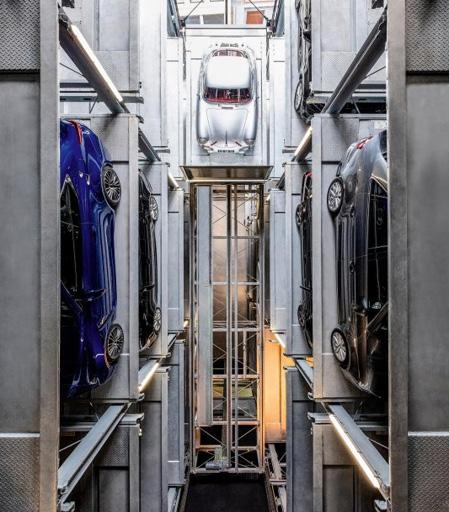OP-ED Code at the Border
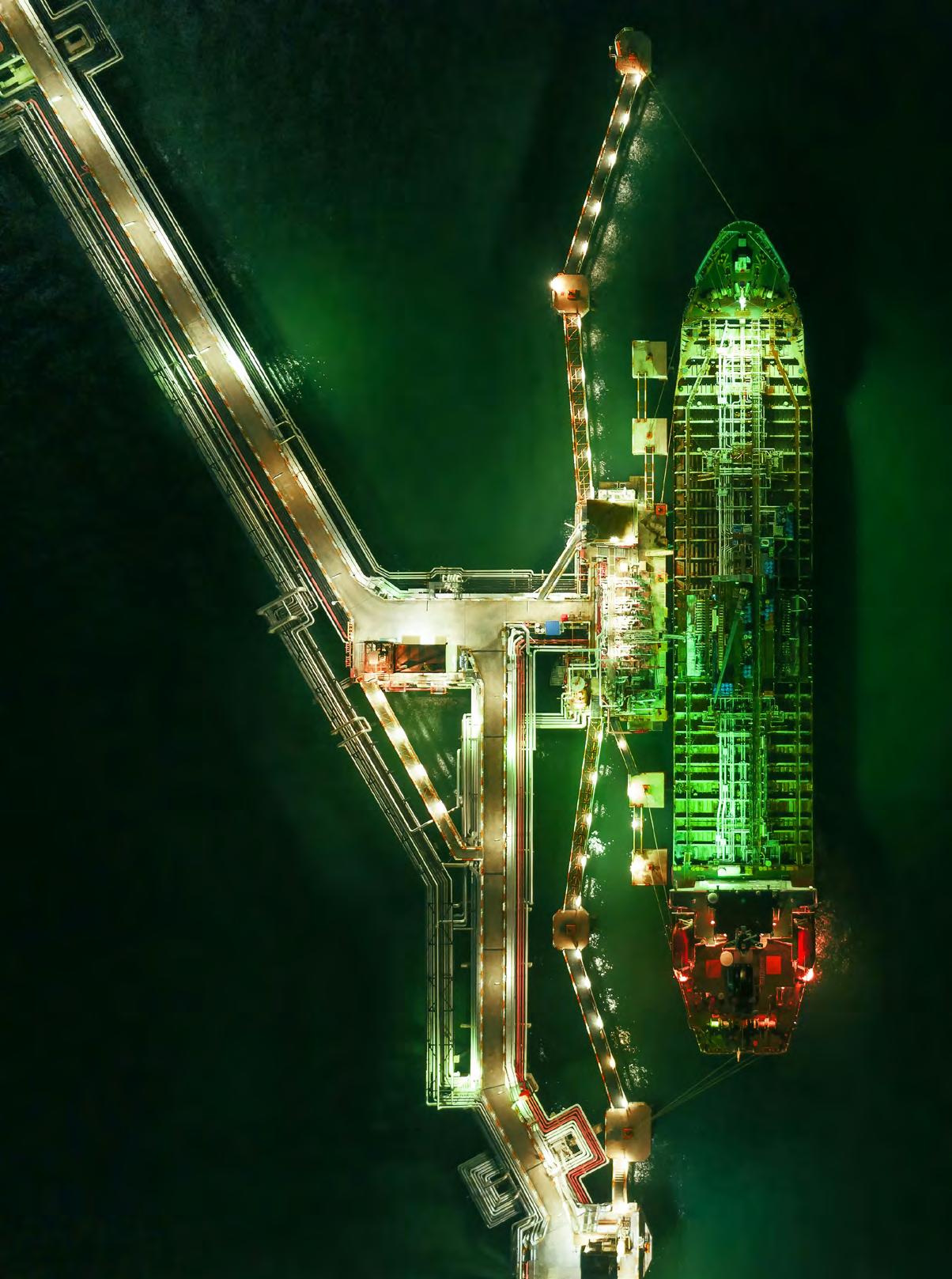
CONNECTING TRADE PROFESSIONALS WITH INDUSTRY INTELLIGENCE

OP-ED Code at the Border

CONNECTING TRADE PROFESSIONALS WITH INDUSTRY INTELLIGENCE
Old oil routes are breaking. New fuels and shifting flows are opening big opportunities for the Gulf to lead in next-gen logistics
EXPERT INSIGHT The Intelligent Chain DIPLOMATIC LOGISTICS Not Just Another Shipment

New IVECO S-Way: high technology and efficiency on all missions
A wide choice of Euro III / V diesel engines, delivering class-leading power from 360 hp to 560 hp Euro III / 570 hp Euro V and superior fuel economy. 12-speed HI-TRONIX automated transmission with the most advanced technology in its category, electronic clutch and best-in-class torque-to-weight ratio. Full range of fuel-saving devices, such as anti-idling feature, EcoSwitch, Ecoroll and Smart Alternator. Top levels of comfort and safety, with a completely redesigned and reinforced cab, featuring enhanced direct visibility and enlarged cab livability.
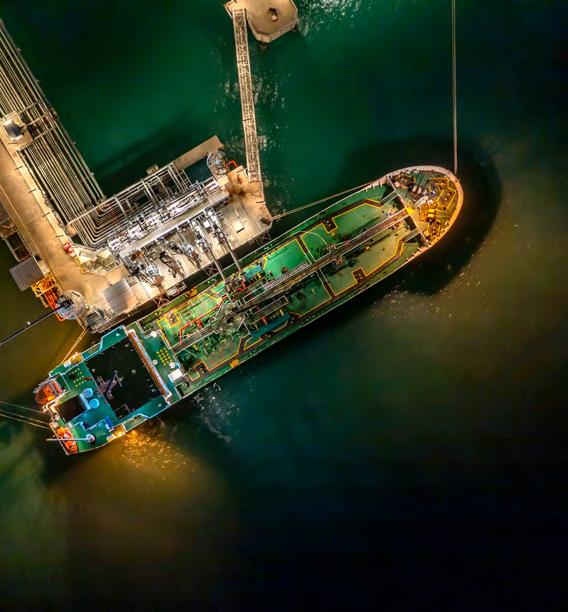
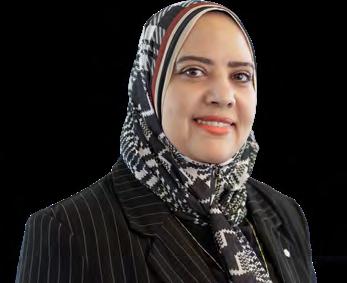
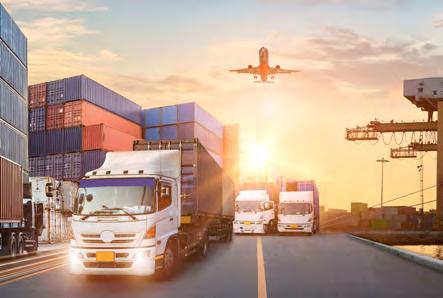
54 SUSTAINABILITY GREENER WATERS AHEAD: MARITIME INNOVATION AND THE PROPULSION REVOLUTION
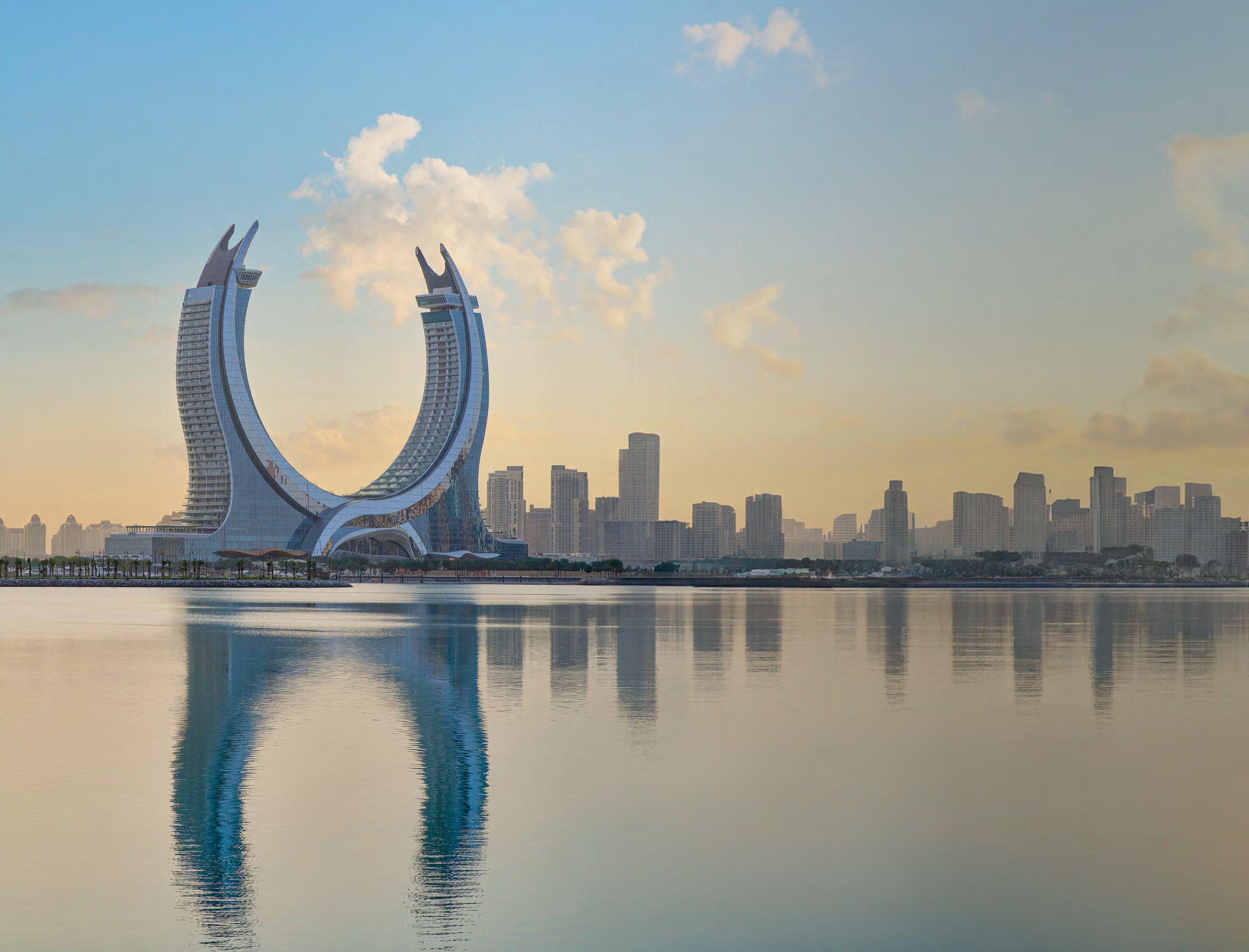
Nestled by the coast of Lusail sits the splendor of Raf es and Fairmont Doha, where luxury is rooted in even the smallest details. Open the doors to mesmerizing hospitality and make memories in a world of sophistication.

CONNECTING TRADE PROFESSIONALS WITH INDUSTRY INTELLIGENCE
CONNECTING TRADE PROFESSIONALS WITH INDUSTRY INTELLIGENCE
CEO
Wissam Younane wissam@bncpublishing.net
Managing Director
CEO
Rabih Najm rabih@bncpublishing.net
Wissam Younane wissam@bncpublishing.net
Group Publishing Director
Director
Joaquim D’Costa jo@bncpublishing.net
Rabih Najm rabih@bncpublishing.net
Commercial Director
Group Publishing Director
Andrea Mocay andrea@bncpublishing.net
Joaquim D'Costa jo@bncpublishing.net
Editor
Editor-in-Chief
Aya Zhang aya@bncpublishing.net
Vibha Mehta vibha@bncpublishing.net
Digital Reporter
Managing Editor
Reeba Asghar reeba@bncpublishing.net
Kasun Illankoon kasun@bncpublishing.net
Creative Lead
SUBSCRIBE
subscriptions@bncpublishing.net
subscriptions@bncpublishing.net
PO Box 502511 Dubai, United Arab Emirates P +971 4 4200 506 | F +971 4 4200 196
For all commercial enquiries, contact jo@bncpublishing.net T +971 50 440 2706
PO Box 502511 Dubai, United Arab Emirates P +971 4 4200 506 | F +971 4 4200 196
Christian Harb chriss@bncpublishing.net
Design Christian Harb
Marketing Executive
Junior Art Director Rizaldi Febrian
Aaron Joshua Sinanbam aj@bncpublishing.net
Marketing Executive
Digital Media Producer
Aaron Joshua Sinanbam aj@bncpublishing.net
Alexander Bungas
Videographer
Eduardo Buenagua
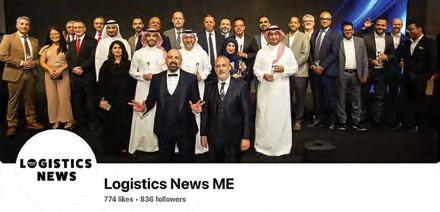
All rights reserved © 2025. Opinions expressed are solely those of the contributors. Logistics News ME and all subsidiary publications in the MENA region are officially licensed exclusively to BNC Publishing in the MENA region by Logistics News ME.
For all commercial enquiries, contact jo@bncpublishing.net T +971 50 440 2706 All rights reserved © 2023. Opinions expressed are solely those of the contributors.
No part of this magazine may be reproduced or transmitted in any form or by any means without written permission of the publisher.
Logistics News ME and all subsidiary publications in the MENA region are o cially licensed exclusively to BNC Publishing in the MENA region by Logistics News ME.
Printed by United Printing and Publishing | upp.ae
No part of this magazine may be reproduced or transmitted in any form or by any means without written permission of the publisher.
Printed by United Printing and Publishing | upp.ae
Images used in Logistics News ME are credited when necessary. Attributed use of copyrighted images with permission. All images not credited courtesy Shutterstock.
In addition to our print edition, we’re bringing you all sorts of industry news on our web mediums. We’re looking forward to interacting with our readers on all of our social media and web platforms. See you on the web!
addition to our we’re bringing you all sorts of industry news on our web mediums. We’re looking forward to interacting with our readers on all of our social media and web platforms. See you on the web!
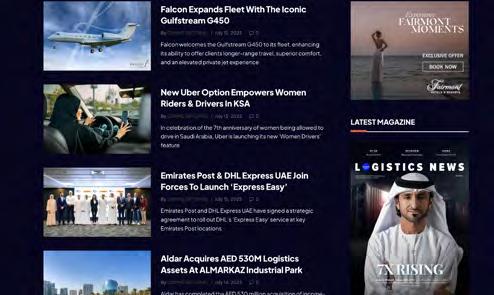
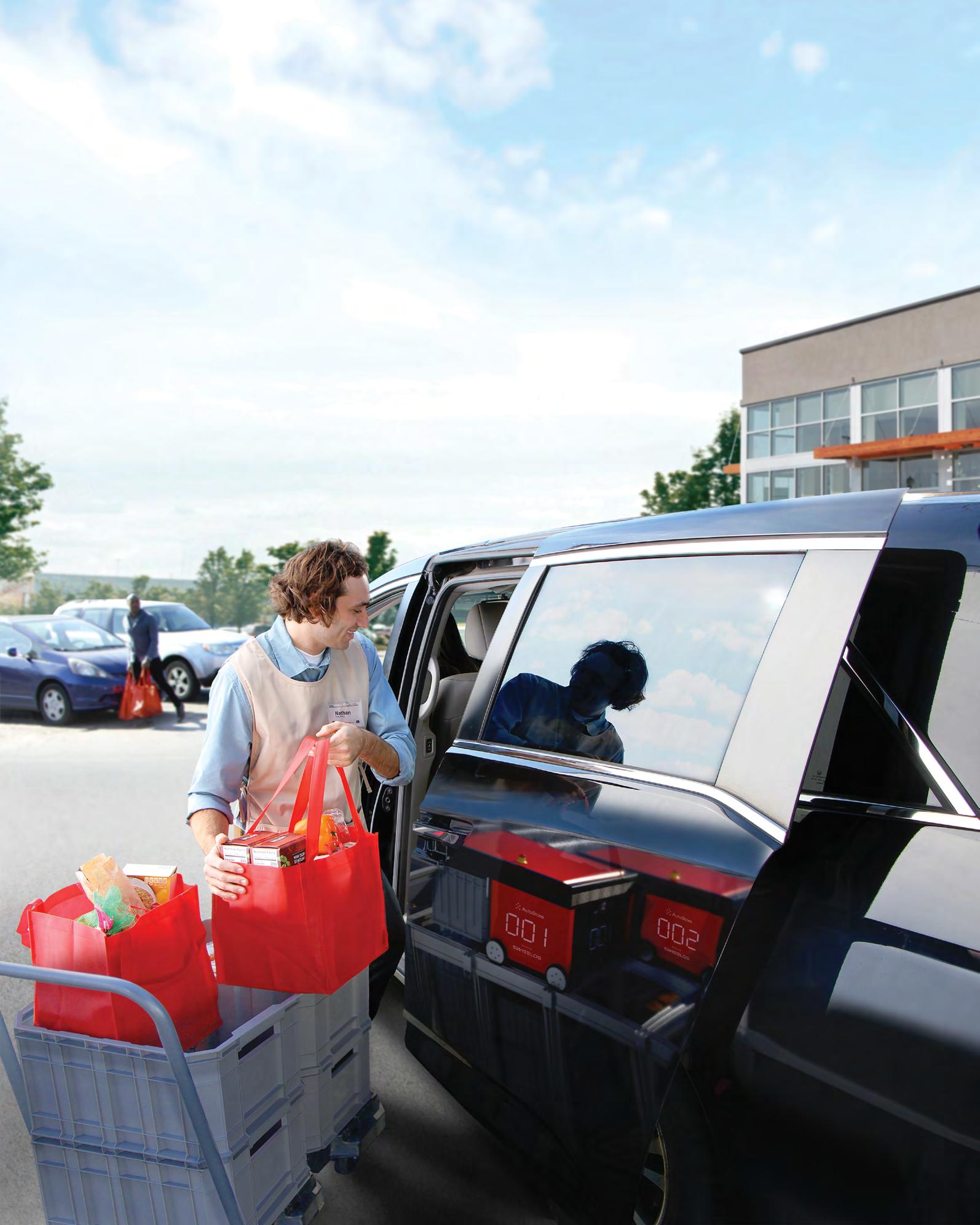
Every so often, the logistics industry finds itself at a crossroads. Not because of a single event, but because the entire operating environment has shifted beneath our feet. That’s exactly where we are now.
In this issue, we examine a sector under pressure, not from falling demand, but from rising complexity. Oil routes are changing. Fuel types are multiplying. And the rules that defined supply chains for decades no longer apply.
The Middle East has long played a central role in the global oil economy. But today, our logistics operators are being called to lead in a different way. This is not about moving more oil. It’s about moving it smarter, cleaner, and faster.
From the ports of Duqm and Fujairah to the rail networks and smart terminals reshaping the Gulf, the future of logistics is being built in real time. That future will not be secured by geography alone. It will depend on infrastructure that is flexible, technology that is predictive, and operations that are resilient.
In these pages, you’ll find insights into how regional players are adapting to disruption and preparing for opportunity. I believe the real story is not about the complexities we face but about how we respond.

Aya Zhang Editor aya@bncpublishing.net
Xiaoyue (Aya) Zhang xiaoyuezhangg






























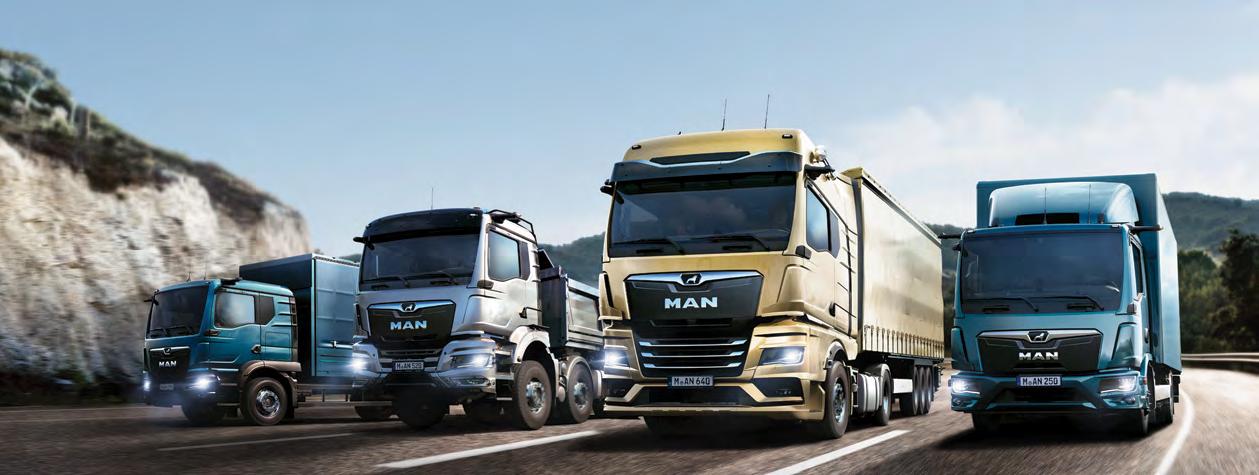












































DHL Supply Chain has announced a series of leadership appointments designed to reinforce its customer-first strategy and accelerate global growth, Effective 1 September 2025, the changes mark another step forward in executing the company’s Strategy 2030.
Andries Retief has been appointed Chief Development Officer (CDO), reporting to Hendrik Venter, CEO DHL Supply Chain. With over 15 years of international leadership experience across Europe, Middle East & Africa, and Asia, Retief has a strong record of driving growth initiatives, developing customer-driven solutions and forging strategic partnerships.
In his new global role, Retief will lead the development of nextgeneration supply chain solutions, strengthen strategic partnerships, prioritising customer engagement and satisfaction and drive customercentric growth initiatives worldwide. A key part of his remit is working closely with DHL Supply Chain’s international customer leadership
network to ensure that customer needs are consistently embedded into strategy and execution, while tailoring solutions to local markets.
As part of this strengthened network, Marco Brüggemann has been appointed Chief Customer Officer for DHL Supply Chain Europe and Bremer Pauw as Chief Customer Officer for Middle East & Africa.
Brüggemann, with DHL since 2002, has held major strategic and commercial roles across Latin America and Europe, most recently driving customer supply chain transformations in e-commerce in Germany & Alps enabling rapid expansion of omni-channel e-commerce operations for DHL’s customers.
Pauw, currently Managing Director for Africa, has a proven track record of building high-performing teams and delivering customer-focused logistics solutions across diverse and complex markets, he will be based in Dubai, UAE Pauw continues to serve as Managing Director, DHL Supply Chain Africa. As Chief Commercial Officer
for MEA he will lead commercial strategy and customer development across the region. Together with their counterparts in the Global Team and across Asia Pacific, North America, Latin America and the UK & Ireland, Brüggemann and Pauw will collaborate with Retief to ensure DHL customers experience seamless, resilient and sustainable supply chains worldwide.
Hendrik Venter, CEO DHL Supply Chain, commented: “These appointments further strengthen our global customer leadership team and focus on excellence in customer experience. Andries’s extensive background in driving growth initiatives and cultivating strategic partnerships will be instrumental in fostering a culture of customercentricity across the organization. By connecting our global customer leadership network and our integrated global logistics network, we ensure customers benefit from both global reach and deep local expertise— helping them navigate today’s challenges and prepare for tomorrow’s opportunities.”
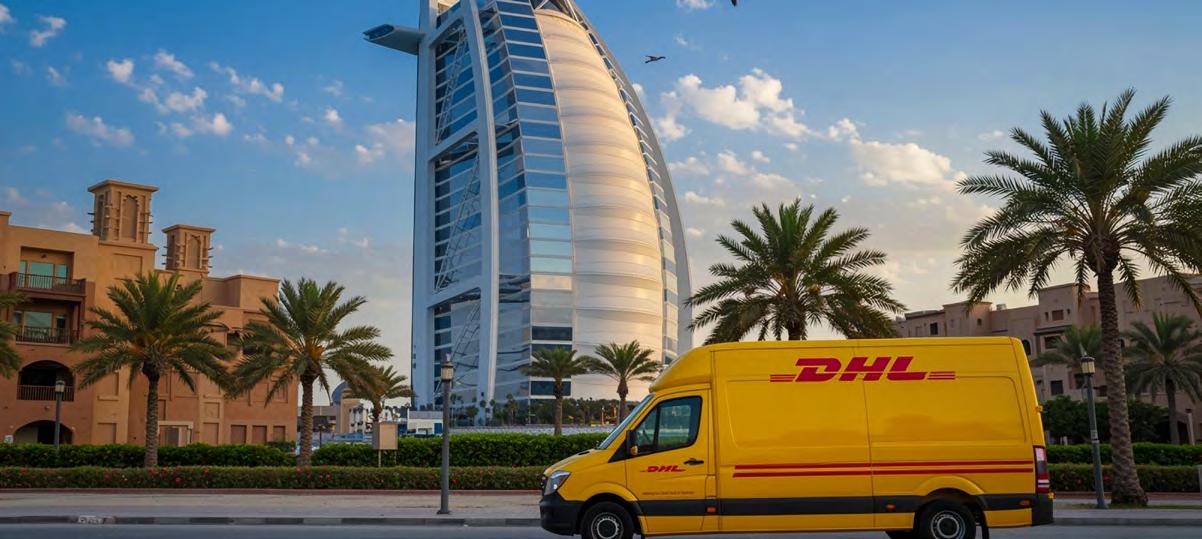
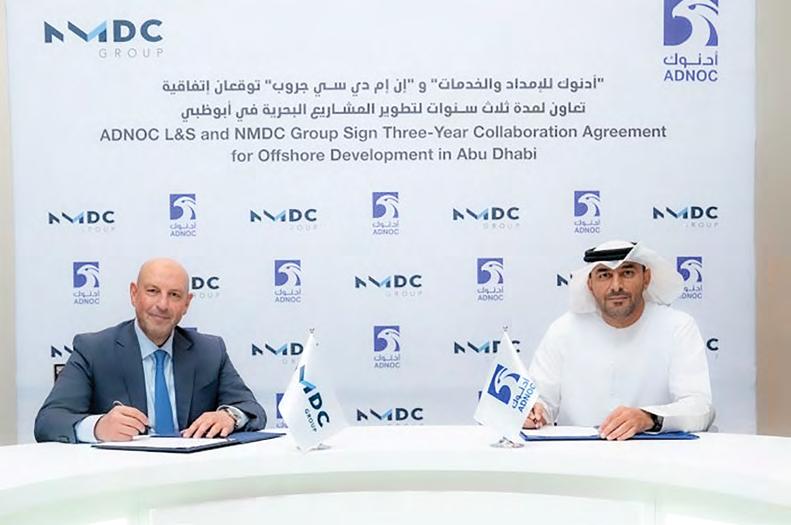
NMDC Group, a global leader in engineering, procurement, construction (EPC), and marine dredging, and ADNOC Logistics and Services, a global energy maritime logistics company, announced today a three-year agreement to explore collaboration on delivering maritime services for offshore projects.
The agreement was signed by Engineer Yasser Zaghloul, Group CEO of NMDC Group, and Captain Abdulkareem Al Masabi, CEO of ADNOC L&S, at NMDC’s headquarters in Abu Dhabi.
This agreement strengthens the long-standing partnership between NMDC and ADNOC L&S, establishing an expanded
framework for continued collaboration on offshore EPC projects in Abu Dhabi. It includes provisions for marine services and integrated logistics, reinforcing both companies’ commitment to supporting the emirate’s offshore energy sector.
“Therefore, it is crucial that we are aligned to ensure we maximise our effectiveness in our sectors for Abu Dhabi and our shareholders. This agreement will ensure a robust framework between our two powerhouse organisations that will enable us to focus on synergies across the different sectors in which NMDC Group and ADNOC L&S operate to propel collaboration, market sector differentiation and value growth that will further strengthen the critical industrial marine sector in Abu Dhabi and beyond,” he added.
Captain Abdulkareem Al Masabi, CEO of ADNOC L&S, said “This partnership supports ADNOC L&S’s long-term objective to provide world-class, integrated logistics solutions that enable the UAE’s offshore energy growth. By combining our expertise with NMDC, we will create new opportunities, deliver value to ADNOC, our shareholders and our customers, and advance the UAE’s economic development.”
ADNOC L&S continues to focus on delivering enhanced performance across its offshore logistics segment through collaborations such as this agreement with NMDC.
Eng. Yasser Zaghloul, CEO of NMDC Group, said: “NMDC Group has, for more than 50 years, proven its unparalleled experience and capability in multi-sector marine EPC infrastructure delivery and complex project logistics. The launch of NMDC LTS, our most recent vertical, enabled the market to benefit from these capabilities and expertise. ADNOC L&S has also established itself as a leader in the sectors of offshore energy support and hydrocarbon logistics services. Both entities operate some of the largest marine fleets in the region.”
7X, the UAE’s leading trade, transport, and logistics holding group, has launched ‘Waslah Post’, the world’s first digital marketplace aggregating postal operators.
Announced at the 28th Universal Postal Congress – Dubai 2025, Waslah Post represents a strategic leap forward, partnering postal networks worldwide and enabling e-commerce growth through a borderless, digitally connected platform.
By providing digital sales channels, aggregated volumes, and access to cross-border demand, Waslah Post shall transform the role of postal operator, allowing offline or fragmented operators to become discoverable and “digitally bookable,” while larger networks capture new inbound revenue streams and volume growth. Built on Universal Postal Union (UPU) frameworks and existing bilateral agreements, the platform intends to complement and enhance the postal ecosystem, turning fragmentation into federation and reinforcing posts as critical infrastructure in the digital economy.
Tariq Al Wahedi, Group CEO of 7X, said: “Waslah Post is a natural extension of 7X’s platform strategy alongside NXN, EMX, and FINTX. By digitising and aggregating postal operators, we enable them to scale volumes, capture new revenues, and remain central to the global logistics landscape, while empowering SMEs, e-commerce players, and individuals to trade seamlessly across borders. This is about futureproofing the industry and partnering networks worldwide for a borderless future.”
By connecting posts into a unified marketplace, Waslah Post will democratise access to global trade. SMEs, micro-sellers, and individuals will be able to ship cross-border transparently and cost-efficiently, while e-tailers and marketplaces gain scalable, affordable access to postal networks for global fulfilment, checkout integration, and returns management.
Leveraging the inherent carbon efficiency of postal networks, Waslah Post will provide governments and regulators with a scalable, inclusive, and sustainable alternative to fragmented courier flows. It positions postal operators as the green choice in cross-border logistics, directly aligned with UPU’s sustainability mandate.
Nasiba AlShukairy, Group Senior Executive Director of Strategy and Investment at 7X, added: “Waslah Post is a cornerstone of our strategy to strengthen 7X’s position as a future-ready logistics and digital infrastructure enabler. By federating postal networks and connecting them with SMEs and e-commerce players, we are unlocking scale, enabling new value creation, and embedding 7X at the centre of digital trade flows. Waslah Post will be the gateway to a borderless logistics future, where 7X unites posts, businesses, and consumers into one connected ecosystem.”
Waslah Post is designed to evolve beyond shipping by embedding fintech solutions through FINTX, 7X’s fintech arm, to enable seamless SME and e-tailer pay-in/pay-out, and drive financial inclusion in emerging markets. In addition, it will deliver deep e-commerce integrations by connecting directly with e-tailers and marketplaces, enabling cost-efficient fulfilment, checkout integration, and affordable reverse logistics. Complementing these capabilities, Waslah Post will leverage global postal data insights to aggregate flows, optimise pricing and routes, and bilateral negotiations, creating a defensible data layer. At the same time, it will activate key sustainability levers, positioning itself as the carbon-efficient, governmentaligned choice.

Together, these levers ensure Waslah Post becomes the infrastructure backbone of postal operators, SMEs, and the global e-commerce ecosystem, powering a future-proof marketplace for borderless trade.

Gulftainer, a UAE-based global end-to-end supply chain, logistics and multi-purpose ports solutions provider, has set a new benchmark for trade and logistics in the UAE with the launch of the country’s first bonded Inland Container Depot (ICD) in Sharjah.
The facility is now fully operational and marks a major milestone in enhancing the UAE’s logistics infrastructure and trade efficiency.
Strategically located just 20 km from Sharjah Port and 140 km from Khorfakkan Port, the new Sharjah ICD offers seamless multimodal connectivity between seaports
and inland markets. It is designed to streamline customs processes, accelerate cargo movement, and deliver cost-effective logistics solutions for importers, exporters, NVOCCs, and carriers.
The Sharjah ICD is equipped with cutting-edge technology, including advanced mobile container handling equipment and a high-speed computer system, enabling fast, reliable operations. Its integration with regional and international supply chains aims to significantly strengthen the UAE’s role as a global logistics hub.
Farid Belbouab, Group CEO of Gulftainer, said: “The launch of Sharjah
ICD sets a new benchmark for trade in the UAE. Gulftainer is proud to introduce the UAE’s first bonded Inland Container Depot in Sharjah, a strategic development designed to redefine the flow of trade across the region. With this milestone, we reinforce Gulftainer’s role in strengthening Sharjah and the UAE as leading hubs for global trade and logistics.”
The bonded facility at Sharjah ICD provides added flexibility and efficiency for cargo movement, supporting businesses with faster processing and reduced operational costs. The facility will play a vital role in transforming regional logistics and supply chain dynamics.

Sustainability is becoming one of the greatest challenges and opportunities for resilience and innovation in modern supply chains. Regulatory pressures, consumer values, and investor priorities are all increasingly focused on guaranteeing that supply networks are being operated in socially responsible and environmentally sustainable ways. While companies have made significant progress in measuring emissions, better utilisation of resources, and ethical sourcing, sustainability risks still arise in intricate and unforeseen ways. Artificial intelligence (AI) is in a position of revolution in this context, not merely to monitor and report, but to anticipate and contain risks even before they escalate beyond control.
The traditional method of managing sustainability risks along supply chains has remained reactive in nature. Issues such as supplier noncompliance with environmental regulations, deforestation resulting from raw material extraction, or human rights violations often only come to light after the event, leaving companies to struggle with responses. AI shifts the paradigm from reactive response to proactive prevention. With predictive analytics, pattern detection, and real-time monitoring, AI systems can detect early warning signs of sustainability issues and make swift interventions.


One of the biggest hurdles in sustainable supply chain management is the lack of visibility beyond the first tier of suppliers. Companies, in most cases, can trust that their immediate vendors are compliant, but they have no visibility into the practices of second or third-tier suppliers. Data mining and natural language-based artificial intelligence programmes can search publicly available data, trade reports, and satellite imagery to initiate warnings for possible sustainability breaches deep within the supply chain. For example, AI can read several hundred articles of local news in several languages, environmental reports, and government databases to detect trends of unauthorised logging, water pollution, or labour strikes in supplier areas. When mapped against procurement history records, enterprises have a better understanding of indirect risk and can respond prior to it impacting production or reputation.
Predictive capabilities of AI can be effective in predicting environmental risks that can hit the supply chain. AI models that help in predicting supply chain disruption include machine learning,
forecasting, simulation and optimisation models. Machine learning algorithms trained with past weather trends, transportation outages, and commodity price variances can predict the possibility of weather-related disruptions like floods, droughts, or heat waves in supplier locations. For instance, in agricultural supply chains, AI can integrate climate forecasts with crop yield data to predict shortages or price spikes months in advance. This not only allows companies to secure alternate sourcing but also allows them to collaborate with farmers for adaptive practices that minimise environmental footprint. Likewise, AI models can predict energy drought or water stress in manufacturing centres, which will drive companies to re-engineer operations in a manner that reduces depletions of resources.
Traditional audits are typically scheduled annually or biannually, creating gaps during which unsustainable practices remain unobserved. AI-enabled monitoring systems close this gap by providing continuous oversight. Internet of Things (IoT) sensors embedded in factories, warehouses, and transportation fleets can feed data on energy consumption, emissions, and waste generation directly into AI platforms. The AI then scans this data for anomalies that could signal inefficiencies or non-compliance. When a supplier’s emissions increase sharply, the system may raise the variance, identify its source, and suggest remedial action. This builds up over time into a feedback loop where suppliers not only react to
flags but also implement greener practices to avoid repeat flags.
In addition to the environmental dimension, sustainability includes social and governance issues. AI can help identify misuses of human rights like poor wages, unsafe work conditions, or forced labour. AI can identify discrepancies by verifying supplier agreements, worker files, and publicly available reports that can suggest unfair practices. AI visual recognition from satellite or drone images can also aid in confirming land use and plant conditions in remote areas, making it harder for violations to go unnoticed. Along with blockchain traceability, these technologies have the ability to give an authenticated chain of ownership for products, providing regulators and consumers with ethical sourcing.
Artificial intelligence systems have the potential to bring together communications, allowing for smooth coordination of effort among supply chain partners. Organisations can involve stakeholders in sustainability efforts through AI insights, mapping the territories of transformation and tracking progress. Not only does this increase operational effectiveness, but it also encourages responsibility for sustainable processes, finally producing a stronger, greener supply chain.
Although the advantages of AI sustainability risk management
are immense, challenges accompany them. Data quality is still a major issue; erroneous data or incomplete data might result in false alarms or missed warnings. In addition, AI systems must be designed to avoid bias so that all vendors are assessed based on clear and equitable standards. Of the same concern is the need for effective professionals with the expertise to interpret AI results and integrate them into strategic decision-making. AI should be viewed as a tool of powerful capability to augment human judgment rather than replace it. The most effective sustainability risk management frameworks combine AI’s analytical capabilities with the contextual understanding and ethical
oversight of experienced supply chain managers.
The imperative to manage sustainability risks in supply chains will only grow stronger in the years ahead. Climate change, geopolitical tensions, and changes in consumer attitudes will continue to impose distinct demands upon supply networks. AI provides a path forward, one that allows businesses to transition from a reactive to an anticipatory and preventive state. By embedding AI into their sustainability agendas, corporations can gain better visibility into complex networks, avoid and mitigate environmental and social risks, and respond with agility and foresight to emerging issues.
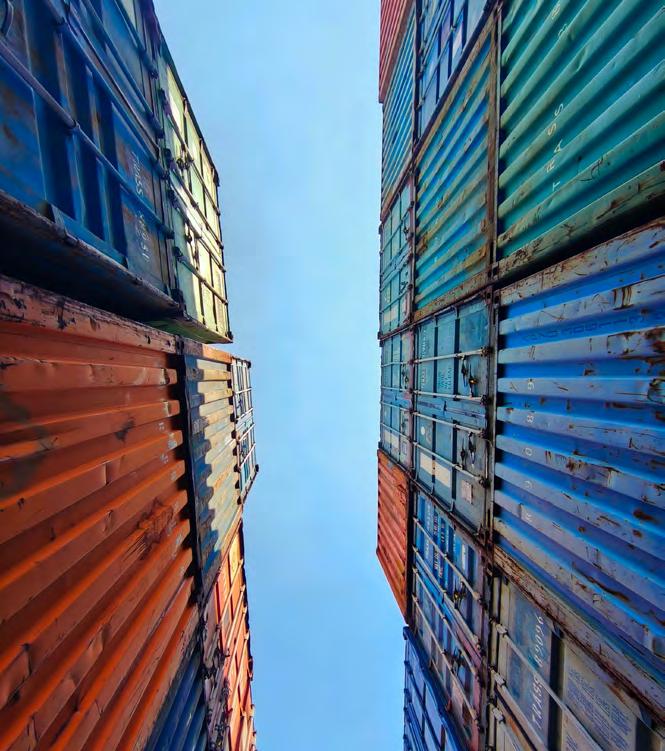
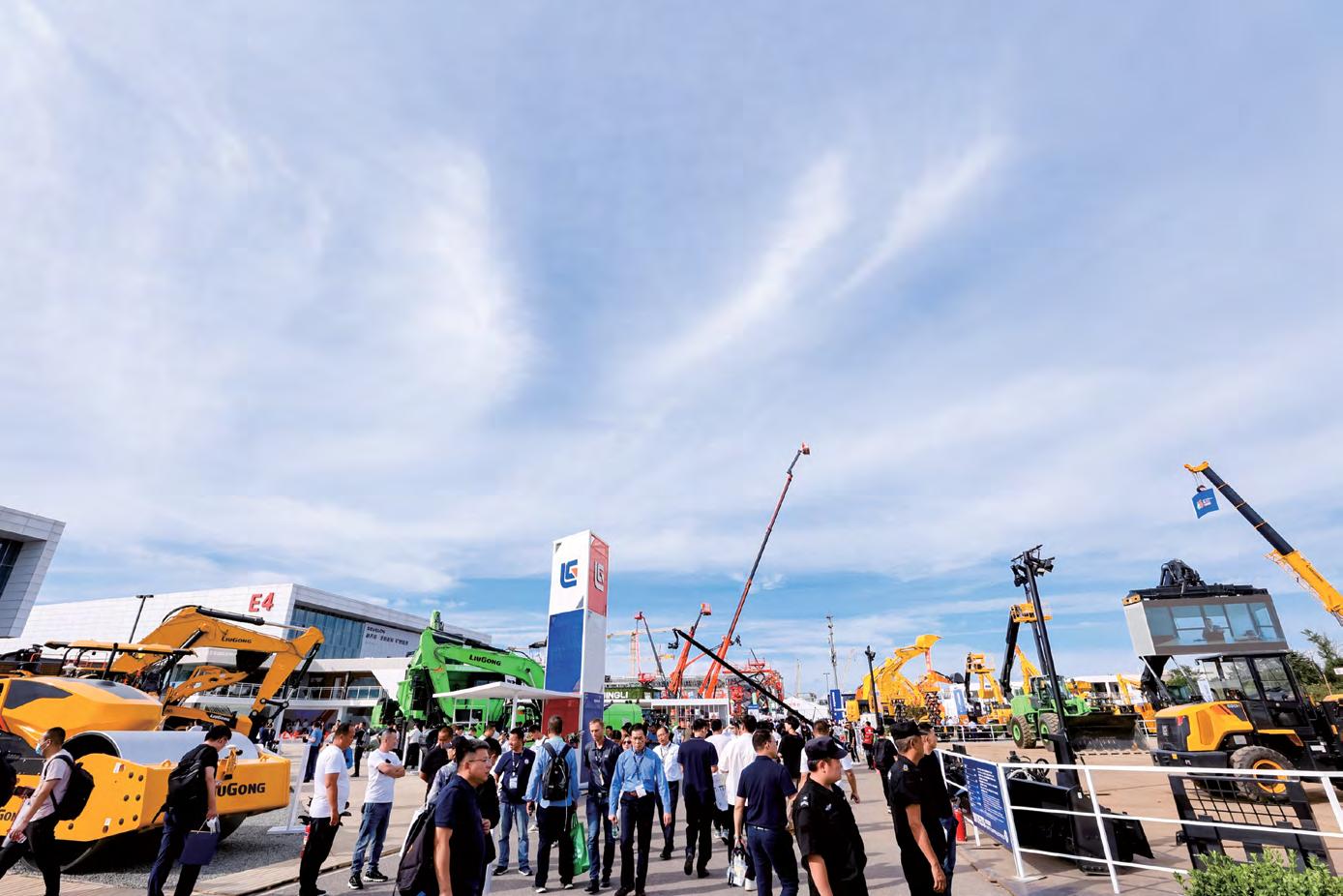




In the race to redefine cross-border last-mile logistics, AI and automation aren’t just tools, they’re the new terrain
The logistics industry in the MENA region is a sector loaded with the lifeblood of commerce, innovation, and economic integration. As cross-border trade accelerates under transformative initiatives like Saudi Arabia’s Vision 2030 and the UAE’s bold digital economy strategies, last-mile delivery is emerging as the final frontier of competitive advantage. With that being said, the question is no longer if automation and AI will reshape this segment, but how fast and how boldly players in our region can lead this transformation.
On a personal level, I believe the convergence of artificial intelligence and intelligent automation holds the key to unleashing hyper-efficient, cross-border last-mile networks, and this will form a move that will define market leaders in the coming decade.
Traditional routing systems rely on historical data and static inputs. In contrast, AI-powered routing is dynamic, predictive, and responsive. By leveraging real-time traffic conditions,
customs clearance statuses, weather patterns, and customer behavior signals, AI algorithms are now capable of recalibrating delivery routes on the fly, across borders, cities, and regulatory regimes.
In the MENA region, where infrastructure maturity, customs policies, and road conditions vary greatly from one country to another, AI-driven routing has become a necessity. A delivery truck moving from Riyadh to Muscat should no longer rely on pre-set route plans. Instead, it should operate on live intelligence, which is constantly re-optimised based on hundreds of variables including port congestion, drone availability, warehouse load balancing, and even geopolitical risk assessments.
There is no doubt that the future of crossborder logistics will be built on code and machines. Automation, whether in customs documentation, smart warehousing, autonomous loading, or delivery confirmation,

Nacouzi, Founder & CEO, Transcorp International
will be the engine driving down operational costs and boosting reliability. Consider the impact of robotic process automation (RPA) on customs clearance. By integrating AI with national digital border systems, packages can be pre-cleared, tax-calculated, and classified even before they leave the dispatch hub, minimising friction and accelerating throughput. Meanwhile, smart fulfilment centers equipped with automated picking systems, collaborative robots, and AI-driven inventory prediction will redefine cross-border scalability. In a region where demand peaks around Ramadan, Black Friday, and national holidays, this intelligent automation can provide a level of elasticity and responsiveness previously unimaginable.
Personalisation at the Last Yard
AI’s true power shines in operational efficiency as well as in creating hyper-personalised delivery experiences. Through machine learning models trained on behavioral data, logistics firms can now anticipate when and where a customer is most likely to receive their package, offering dynamic time slots, autonomous locker pickups, or even drone deliveries on rooftops in urban environments. This level of personalisation is particularly relevant in MENA, where cultural nuances, urban planning, and address systems can be uniquely challenging. AI bridges these gaps by learning preferences over time, transforming last-mile delivery into a brandbuilding interaction, not just a transaction.
What sets the MENA region apart is its ability to leapfrog legacy systems. We are not weighed down by decades of outdated infrastructure. We have the opportunity, and the necessity, to build digital-first, AI-native logistics ecosystems from the ground up. Initiatives like the UAE’s ‘NextGenFDI’ to attract digital companies or KSA’s logistics zone liberalisation are setting the stage for AI-powered logistics corridors, where data, goods, and intelligence flow seamlessly across borders.
No single company, however innovative, can reshape the cross-border last-mile alone. It will take ecosystems of collaboration, between tech companies, regulators, logistics providers, and infrastructure investors. AI thrives on data, and automation thrives on integration. Governments and the private sector must work hand in hand to unlock interoperable standards, data trust frameworks, and regulatory sandboxes.
As we look toward the next decade, the borders that matter most will surely be technological. Those who embrace AI and automation will redefine what logistics borders mean. I believe that the next great logistics leap will come from this region, and from those bold enough to lead.
Melissa Pertusi, Shipping Director at International Diplomatic Supplies, reveals the untold story of diplomatic logistics – a field where global diplomacy quietly depends on precision shipping, airtight security, and flawless timing
When most people picture diplomacy, they think of handshakes, negotiations, and carefully worded statements. What’s often overlooked, however, is the hidden system that makes diplomacy work: logistics. Behind every embassy reception, every foreign mission, and every delivery of sensitive equipment halfway across the globe lies a logistical network unlike any other.
For those unfamiliar with the field, diplomatic logistics follows the Pareto principle: about 80% resembles ordinary cargo management, while the remaining 20% requires a specialised expertise unique to diplomatic service. At first glance, diplomatic cargo is not extraordinary. It travels in standard shipping containers, moves on the same ships as thousands of other goods, and passes through familiar global carriers. The distinction emerges not from the box itself, but from the label on the paperwork. A single phrase on the bill of lading – “diplomatic cargo” –transforms the entire journey. Doors that stay closed to normal freight suddenly open – though only a select few professionals truly understand why.
Diplomatic shipping runs on two tightly connected tracks: the physical movement of goods and the movement of documents. Trucks, ships, planes, and warehouses keep items moving across borders, while bills of lading, customs declarations, and diplomatic clearances ensure the paperwork keeps pace. Both must align perfectly. A delayed shipment of furniture or event supplies can undermine entire operations. In

this field, success isn’t just about speed—it’s about synchronisation.
Of course, diplomatic logistics never operates in a vacuum. Geopolitical dynamics and global supply chain conditions exert enormous influence. Yet, it is the logistics departments of diplomatic suppliers who must interpret those conditions and craft workable solutions. One of their most pressing concerns is chain of custody – the continuous and unbroken record of who has handled the cargo, when, and where. Historically, this was tracked through scan-based systems, with cargo tagged and updated at specific checkpoints. Today, however, a shift is underway. Internet of Things (IoT) sensors are gradually replacing static scans, allowing realtime, continuous visibility of sensitive cargo. For such shipments that cannot afford uncertainty the ability to monitor location, temperature, and even tampering attempts minute by minute is transformative.
But the challenges extend far beyond technology upgrades. Resilience is the name of the game. In a world of unpredictable disruptions – canal closures, sudden sanctions, conflict flare-ups, or strikes – diplomatic suppliers must be masters of forecasting and contingency planning. Skilled logisticians will explore carefully all possible paths relying on sophisticated forecasting tools, coupled with key operators to pivot instantly when a crisis erupts and be ready to even change the mode of transportation.
This is where security by design becomes nonnegotiable. Diplomatic cargo is protected by international law – diplomatic pouches, for instance, are considered inviolable. Yet “protected” does not mean “immune.” Cybersecurity threats, insider risks, and increasingly sophisticated attempts at interception mean that simply relying on old conventions is not enough. Today’s diplomatic logistics demands multilayered safeguards: tamperevident seals, zero-trust data architectures, strict custody logs, and encrypted communication channels. In essence, every shipment must be treated as though it could be targeted and designed accordingly. What makes this work remarkable is the balance between respect for tradition – upholding
decades-old diplomatic protections – and the adoption of 21st-century risk management.
The human factor however remains central, yet technology and human expertise operate within strict legal frameworks. The Vienna Convention on Diplomatic Relations and national regulations, such as State Department rules, still set the boundaries of what can and cannot be transported. Innovation, therefore, must coexist with legal tradition. A green transport solution or a blockchain tracking tool, for instance, cannot override the obligation to respect pouch limits and inviolability. In diplomatic logistics, creativity is valuable – but compliance is mandatory.
Looking forward, the conversation cannot ignore the sustainability imperative. Like every corner of the global supply chain, diplomatic logistics faces pressure to decarbonise. Some suppliers are going beyond token gestures, investing not just in carbon credits but also in reforestation projects and humanitarian initiatives that align with diplomatic values. Carriers offering green fuels or carbonoffset shipping options are gaining traction. Here, logistics becomes more than just movement; it becomes part of diplomacy itself, projecting values of responsibility and community development.
In the end, diplomatic logistics is not defined by containers, tracking devices, or even legal frameworks. It is defined by people. From the suppliers crafting resilient routes, to the couriers maintaining custody, to the diplomats who ultimately rely on seamless service, human care is the irreplaceable thread. Technology will continue to evolve – e-commerce platforms, IoT, predictive analytics, green fuels – but innovation in this field will always circle back to trust, expertise, and reputation. For the diplomatic community, the greatest advancement remains not a gadget or software, but the skilled professional who ensures that their wishes are met and their missions continue uninterrupted.
Diplomatic logistics may be 80% ordinary shipping and 20% niche expertise. Yet it is precisely within that 20% that international relations quietly get their supplies.


The global oil supply chain is breaking from old patterns — tankers rerouted, new storage built, new fuels emerging. For logistics operators in the Middle East, this opens up new business opportunities, technology investments, and regional leadership in the future energy economy
In the global machinery that moves oil from wellhead to end user, logistics has long played the role of an invisible engine. Today, that engine is under strain.
Established trade routes are shifting, energy products are diversifying, and infrastructure that once served a single purpose must now adapt. At the center of these changes is the Gulf
region’s logistics sector — facing the task of rethinking systems built for a different era.
The region that mastered the flow of oil exports is now being asked to lead in a broader, more complex context. One that prioritises flexibility, digitalisation, and sustainability alongside throughput and costefficiency.
Security risks in the Red Sea and Bab el-Mandeb have disrupted a key corridor that connects the Indian Ocean to the Mediterranean via the Suez Canal. This route typically carries a significant share of the world’s maritime trade, including oil, gas, and container cargo.
Following attacks on commercial vessels in late 2023 and into 2024, major carriers such as Maersk, CMA CGM, and Hapag-Lloyd either suspended Red Sea operations temporarily or rerouted specific services around the Cape of Good Hope. These alternate voyages can add significant time and cost, depending on vessel type and routing schedules.
While oil prices have remained relatively stable in recent months, the broader impact is being felt across logistics planning. Longer routes and higher insurance premiums are straining fleet capacity and scheduling.
The global transition toward low-carbon fuels is no longer a future ambition. It is reshaping fuel logistics today. Products like green hydrogen, ammonia, and LNG are entering global trade flows — each requiring new handling standards, specialised infrastructure, and safety protocols.
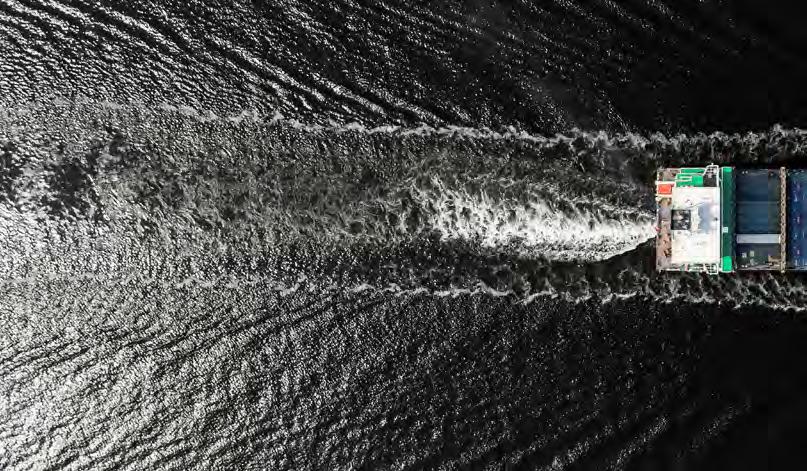
Ports like Salalah and Duqm in Oman are positioning themselves as safer alternatives due to their geographic location and recent investments. Although data on increased vessel calls remains limited in the public domain, industry observers report growing interest in diversifying port calls away from high-risk corridors.
Bunkering strategies are also evolving. With vessels traveling longer distances, demand is rising for flexible refueling hubs. Ports such as Fujairah and Jebel Ali, already established as regional energy logistics centres, are seeing renewed focus on fuel storage and contingency planning.
In the Gulf, efforts are accelerating. Oman is leading the region’s green hydrogen development with major projects in Duqm. In 2025, land use agreements were signed for phases two and three of the ACME green hydrogen and ammonia project, covering 80 square kilometres. These phases are expected to produce approximately 71,000 tonnes of green hydrogen and 400,000 tonnes of green ammonia annually.
Additionally, Oman signed a joint development agreement with the Netherlands and Germany to develop one of the world’s first liquid hydrogen corridors. The corridor will link Duqm with the Port of Amsterdam, enabling hydrogen exports to European markets through multimodal hubs such as Duisburg.
In the UAE, partnerships between DP World and IRENA (the International Renewable Energy Agency) are exploring the decarbonisation of maritime transport and port operations.
and align with future carbon regulations.
Digitalisation Moves from Option to Imperative
As the logistics environment
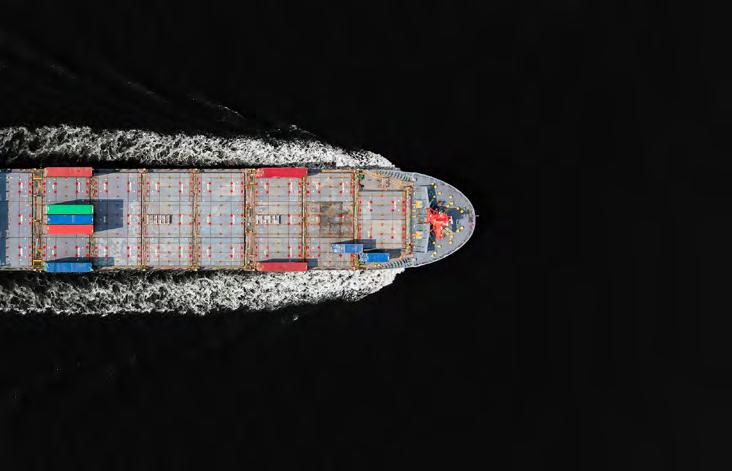
These collaborations aim to develop infrastructure that can accommodate clean fuels
becomes more dynamic, digital systems are becoming essential tools for operational
resilience. Across the region, port authorities and logistics providers are accelerating the adoption of intelligent platforms.
Digitalisation is no longer focused only on efficiency. Increasingly, it is about visibility, traceability, and the ability to adapt. Gulf operators are investing in port community systems, IoT-enabled yard and fleet monitoring, AI-based scheduling, and blockchain for document processing.
Digital twins are now being used to model port operations, simulate disruptions, and test how new fuels or cargo types might affect flow. Predictive maintenance is being applied in container terminals to reduce downtime, while emissions monitoring is becoming standard in preparation for global compliance frameworks.
The Gulf’s Strategic Edge and How to Use It
Geographically, the Middle


East remains an unmatched logistics corridor. The Gulf region connects Europe, Asia, and Africa, supported by deepwater ports, global shipping lines, and decades of infrastructure development.
But geography alone will not be enough. Leadership in tomorrow’s logistics industry will require ports and operators to be flexible in fuel handling, aligned with low-carbon regulations, and digitally integrated across borders.
Governments in the region are taking steps. Saudi Arabia is targeting more than USD 100 billion in investment including transport and logistics sectors by 2030. UAE-based firms such as DP World are expanding their
reach through global terminal investments and digitisation programs.
Key priorities for Gulf logistics leaders include:
• Investing in fuel-flexible terminals
• Building green bunkering infrastructure
• Integrating regional networks through rail, free zones, and digital customs systems
The Gulf’s oil logistics infrastructure remains worldclass. But the systems that support it are changing rapidly.
For logistics professionals across the region, the message is clear: legacy assumptions about fuel types, route reliability, and
profitability need to be reevaluated. The business models of the past will not survive the demands of the new energy landscape.
In their place comes a new logistics mindset. One that values speed over scale, flexibility over fixed infrastructure, sustainability over short-term wins, and data over volume.
The Gulf has the potential to lead this shift — not just as an oil exporter, but as a logistics innovator.
In this evolving energy landscape, the most valuable asset is no longer just the oil itself. It is the ability to move it smarter, cleaner, and faster than anyone else.


The Sustainability Innovation Forum was held On August 29, 2025 at Al Habtoor Palace, Dubai. The forum successfully ignited inspiration and fuelled ambition among construction pioneers, entrepreneurs, hospitality visionaries, and design leaders. Through insightful discussions and pioneering ideas, the forum provided a dynamic platform to explore transformative sustainability solutions that are reshaping industries.
Attendees left empowered with practical, actionable insights, equipped to embed sustainable practices into their projects and drive meaningful change. As key influencers gathered to share knowledge and breakthroughs, the forum fostered an environment ripe for collaboration and the growth of powerful, lasting networks.
Key discussions encompassed sustainable construction practices, the challenge of greenwashing within the context of the UAE’s Net Zero 2050 ambitions, and effective sustainable strategies tailored for designers, architects,


and suppliers in the UAE aimed at reducing carbon footprints. Additionally, a dedicated panel focused on advancing sustainability throughout the entire hospitality chain.
The forum also provided valuable networking opportunities, bringing together professionals from a wide range of disciplines and sectors. This crosssector collaboration encouraged the sharing of ideas and expertise, creating the groundwork for innovative partnerships and more comprehensive approaches to tackling sustainability challenges.
We extend our heartfelt gratitude to all the panellists and speakers whose invaluable insights and expertise made the Sustainability Innovation Forum 2025 truly impactful. Your thoughtful contributions and engaging discussions helped illuminate visionary projects and talents shaping the future of the Middle East’s built environment. Thank you for sharing your knowledge and inspiring the industry to move forward with innovation and excellence.






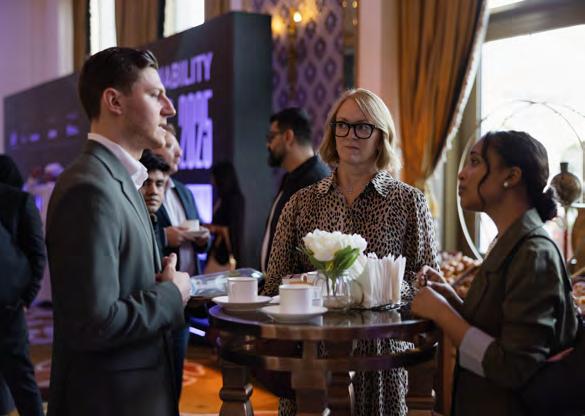

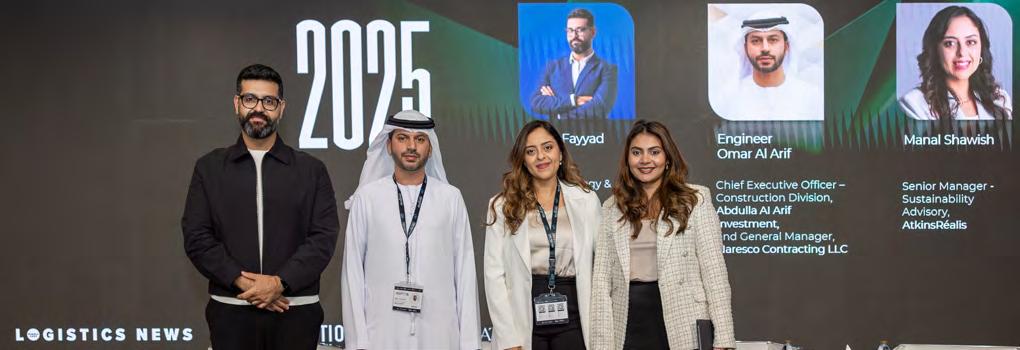

The opening panel centred on two of the most critical sectors shaping the region’s construction industry: construction itself and sustainability. These intertwined disciplines are driving the future of construction in the Middle East. The discussion highlighted the growing urgency of embedding sustainable practices throughout the entire construction process and explored practical strategies to make this a reality. Panellists delved into green building methods, effective pre- and post-construction approaches to maximise impact, and the importance of close collaboration among all stakeholders to meet the ambitious Net Zero targets.
This panel hosted the following speakers:
Majd Fayyad, SM Strategy & Policy Lead, Dubai Supreme Council of Energy

Engineer Omar Al Arif Chief Executive Officer – Construction Division, Abdulla AI Arif Investment, and General Manager Naresco Contracting LLC.
Moderator: Vibha Mehta, Editor in Chief, Construction Business News ME
Manal Shawish Senior ManagerSustainability Advisory AtkinsRéalis

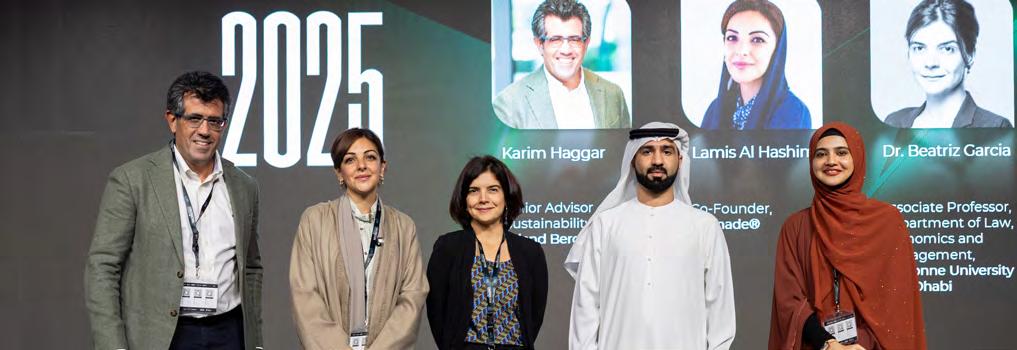

This panel offered a deep dive into ESG strategies that, despite good intentions, may inadvertently cause more harm than benefit to businesses in the UAE over the long term. Experts examined the pitfalls of greenwashing, the complexities of ESG policies, and the unique challenges faced by SMBs, sustainability teams, and end-users. The discussion also explored how technology and AI can be leveraged to advance sustainability efforts, aligned with the UAE’s Net Zero 2050 goals, while outlining clear next steps for meaningful progress.
Speakers on this panel were:
Karim Haggar
Senior Advisor (Sustainability)
Roland Berger Lamis Al Hashimy Co-Founder of Palmade®

Dr. Beatriz Garcia
Associate Professor, Department of Law, Economics and Management
Sorbonne University Abu Dhabi
Moderator: Aalia Mehreen Ahmed, Features Editor, Entrepreneur Middle East
Faisal Sajwani
Managing Partner
MS Consulting

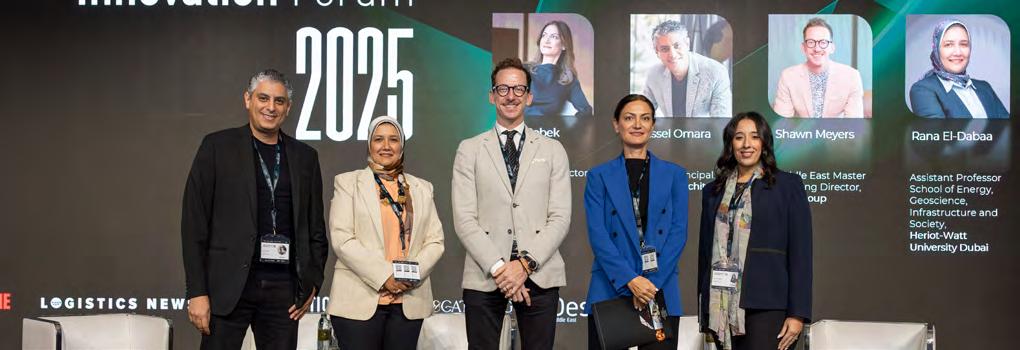

Panel 3: Reducing Carbon Footprints: Sustainable Strategies for Designers, Architects, and Suppliers in the UAE
This panel centred on sustainable urban futures for UAE cities, exploring next-generation materials that promise to advance the industry. Discussions highlighted how technology can enhance urban living, emphasising human-centred sustainability and the power of collaborative efforts to drive meaningful change. Together, these insights showcased how sustainable collaboration can shape resilient communities that lead the UAE’s green agenda.
This panel hosted the following speakers:
Leila Sobek
Founder & Director
BMA Studio Bassel Omara Design Principal Valcarce Architects

Shawn Meyers
Middle East Master Planning Director
DLR Group
Moderator: Hana Abdelzaher, Sustainability Manager, Summertown Interiors
Dr. Rana El-Dabaa
Assistant Professor School of Energy, Geoscience, Infrastructure and Society
Heriot-Watt University Dubai



Panel 4: From Kitchen to Corner Office: Driving Sustainability Across the Hospitality Chain
This panel connected the dots between everyday decisions from menus and food waste to guest service and long-term sustainability planning at the leadership level. Experts explored how various departments approach sustainability, foster shared goals across all tiers, and collaborate effectively with all stakeholders to drive innovation and meaningful change.
This panel included notable speakers as the likes of:
Tiffany McGrath Director, Sustainable Hospitality Sustainability Kiosk
Joanie Dall’anese Head of Marketing Chef Middle East
Jelena Kezika VP Strategy, Global Hotel Alliance
Matt Roberts Director of Sales Unox MEA China & Korea

Omar Shihab Founder and Chief Sustainability Officer
Michelin Green Star restaurant, BOCA
Moderator: Omar Shihab, Founder and Chief Sustainability Officer Michelin Green Star restaurant, BOCA






The Sustainability Innovation Awards 2025 took place on 29 August 2025 at Al Habtoor Palace, Dubai, celebrating visionary leaders and companies at the forefront of sustainability across the region. The event, hosted by BNC Publishing, honoured those driving meaningful environmental progress and innovation.
The region has been propelling in the right direction - where sustainability is the driving force across different industries.
Sustainability and green energy have become cornerstones of progress in the region, with governments and industries prioritizing ecofriendly solutions like never before.
This year’s wave of nominations—both from industry veterans and rising stars—reflected the sector’s growing energy and ambition. We thank everyone who contributed to making this celebration of innovation and excellence a true success.
Congratulations to all the winners of the Sustainability Innovation Awards 2025! Your visionary leadership and groundbreaking efforts are driving meaningful change and setting new standards for sustainability across the region. Your commitment to innovation and environmental stewardship is inspiring, and together, you are shaping a greener, more resilient future for generations to come. Well done on this well-deserved recognition!
Multimedia Production Credits: Eduardo Buenagua, Joel Amparo and Farooq Salik

Winner: Guest Supply

Project: Masdar City Campus – HQ Building
The winning entry is a recognised industry leader in hospitality supplies, bringing over four decades of expertise to the sector. With a proud history of serving the world’s most renowned hotel chains, as well as a wide range of independent properties, the company continues to set the benchmark for quality, reliability, and innovation in hospitality solutions.

Winner: Mubadala Investment Company and Masdar City
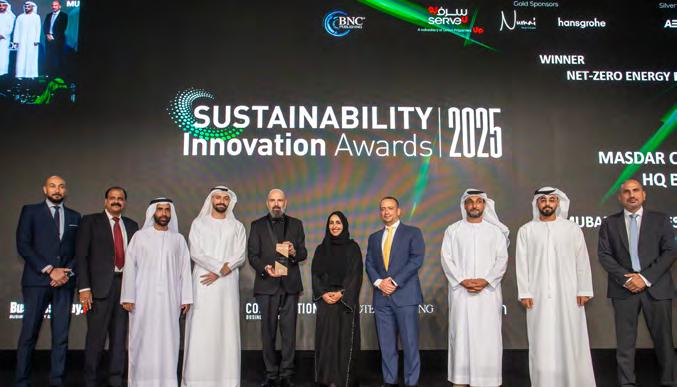
The HQ building of the Masdar City Campus (MC2) is a landmark achievement in the region’s built environment, the first in the MENA region to achieve ILFI Net Zero Energy certification, producing 16.63% more energy than it consumes. Designed as the centrepiece of MC2, the HQ exemplifies Masdar City’s mission to pioneer sustainable urbanism and aligns seamlessly with the UAE’s Net Zero by 2050 strategic initiative.


Sustainable Future Project of the Year
Project: Sobha Waves Opulence
Winner: PNC Architects
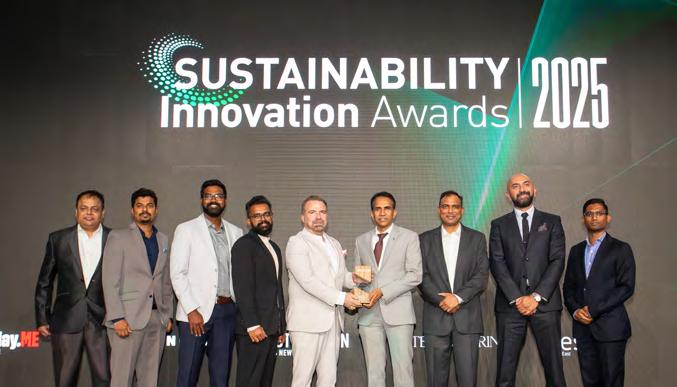
Apioneering waterfront residential tower that seamlessly blends architectural excellence with advanced sustainability. Designed to achieve LEED Gold and EDGE certifications, the project delivers a modelled 54% reduction in energy use, 48% indoor and 69% outdoor water savings, along with a 10% reduction in embodied carbon— setting new benchmarks for sustainable high-rise living in Dubai.
Sustainable Residential Project of the Year
Project: The Sustainable City - Yas Island project
Winner: AtkinsRéalis
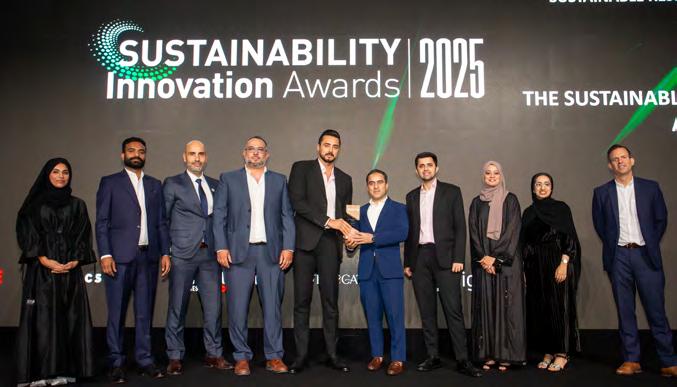
The Sustainable City, Yas Island marks a pioneering milestone in residential sustainability, establishing the UAE’s first fully integrated community founded on the three core pillars of economic, social, and environmental sustainability. This visionary development showcases how residential neighbourhoods can function as self-sufficient ecosystems, all while providing an exceptional quality of life for its 3,514 residents.

Winner: MAG
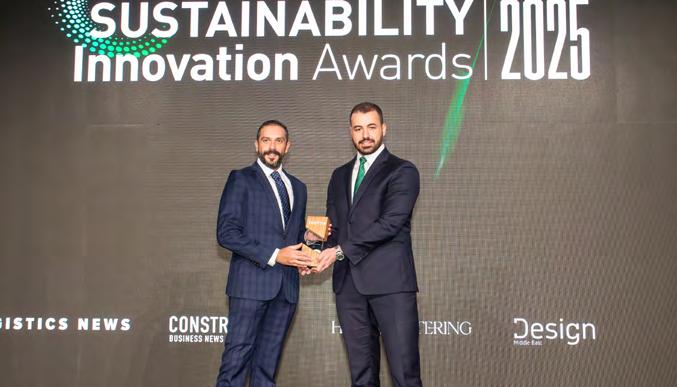
Winner: Summertown Interiors

Keturah Resort by MAG leads globally in sustainable wellness, as the world’s first fully wellness-certified resort. With Biophilic “Bio Living” design, WELL Health-Safety standards, and eco-conscious features, it offers a lifestyle where luxury and sustainability coexist seamlessly.

Summertown Interiors is a UAE leader in sustainable fit-outs, combining environmental excellence with social responsibility. In 2023–2024, the team delivered 24 projects, 21% of which were LEED certified, and diverted 58% of waste from landfill. Backed by its JOURNEY2030 strategy and aligned with Net Zero 2050, Summertown integrates circular economy principles, smart tech, and strong employee training, setting the benchmark for green building across the region.

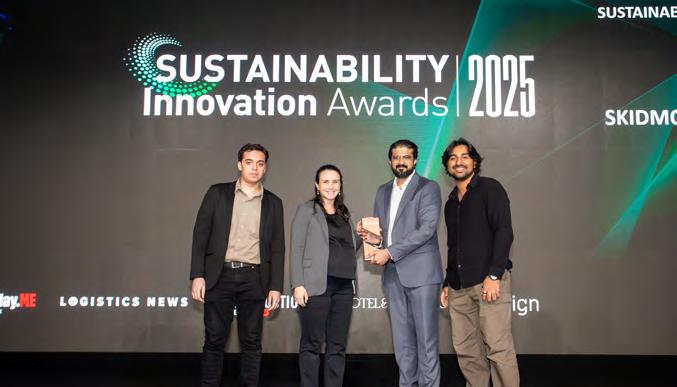
SOM has been named Architecture Firm of the Year in recognition of its unwavering commitment to climate-positive design and global sustainability leadership. With sustainability deeply embedded in its operations, culture, and projects, SOM has delivered measurable impact, from net-zero buildings and carbon-neutral operations to policy influence and regenerative urbanism.

Sustainable
Winner: Innovo
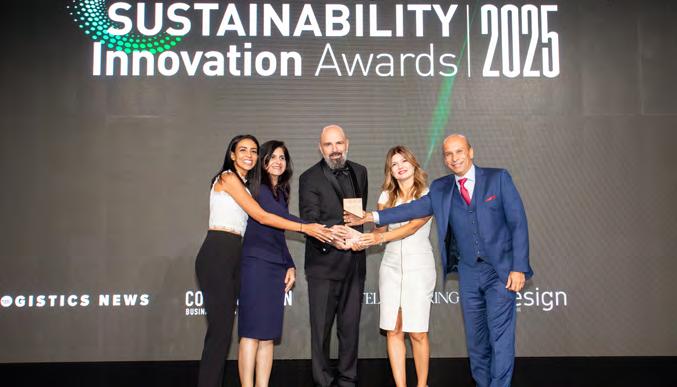
Innovo is recognized for its outstanding commitment to sustainable construction, digital innovation, and responsible development. With a global portfolio of over 130 projects and an ambitious ESG roadmap aligned with the UN SDGs, Innovo continues to lead the industry through data-driven practices, green building standards, and climate-focused initiatives, most notably with Dubai’s first BREEAM-certified luxury waterfront villa development.

Initiative: Net Zero and Green Building Innovation
Winner: Radisson Hotel Group
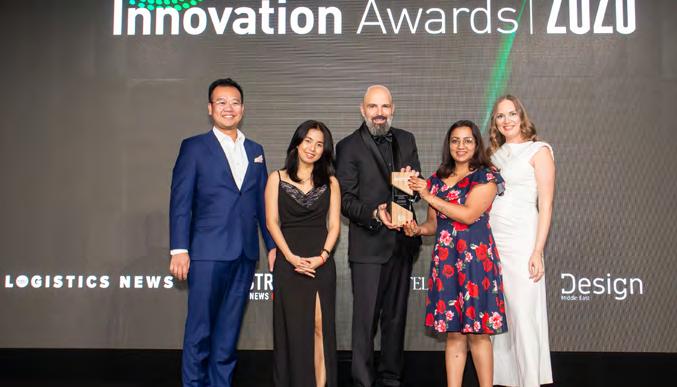
Radisson Hotel Group has been awarded Sustainable Hospitality Leader of the Year, recognising its bold strides toward Net Zero by 2050. With verified Science-Based Targets and a robust strategy focused on green buildings, energy, and operations, RHG has achieved a 33% energy reduction per square metre and a 27% cut in water use per occupied room—setting new benchmarks for sustainable hotel development and inspiring industry-wide transformation.

Green Digital Infrastructure of the Year
Winner: Moro Hub
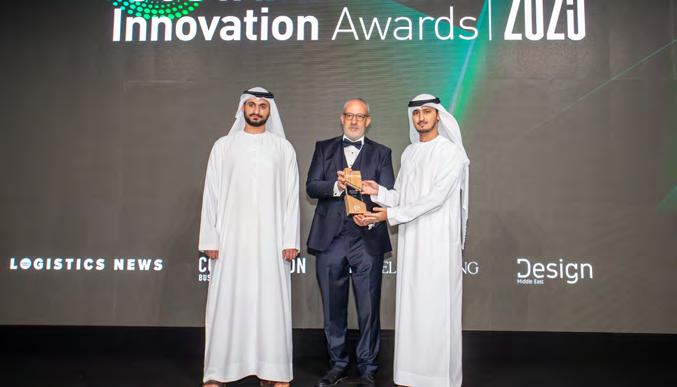
The winner earned the Green Digital Infrastructure of the Year award for its Guinness World Record of holding solarpowered Green Data Center, fully run on clean energy. With its Future Fit Seal, it continues to lead in sustainable, tech-driven innovation.


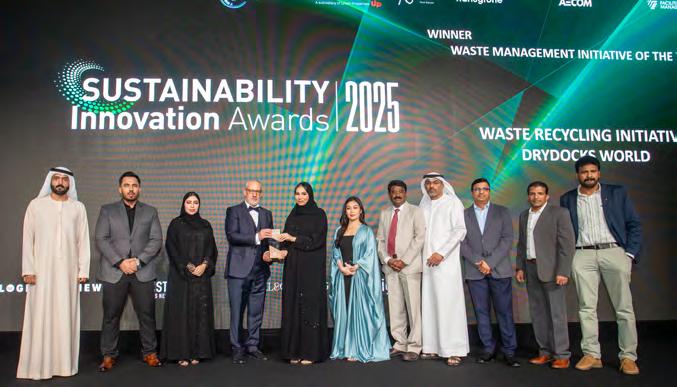
Winner: NEOM - Food Operations
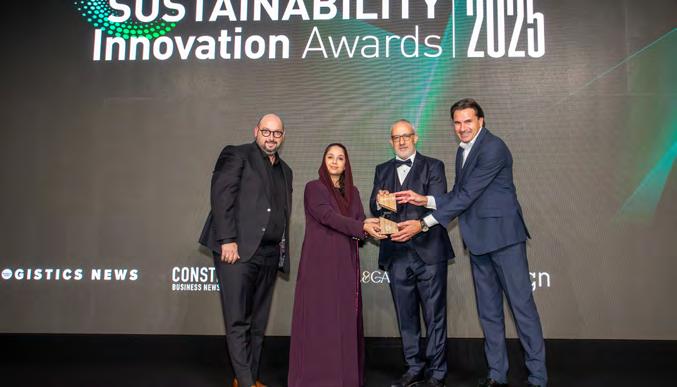
DDW Recognized for its outstanding commitment to waste reduction, resource recovery, and sustainable industrial practices. With 92% of waste recycled, 100% wastewater safely treated, and significant recovery of waste oil, grit, and metal scrap, DDW sets a benchmark for environmental responsibility in heavy industry, demonstrating scalable, circular solutions that reduce environmental impact and support a more sustainable future.
NEOM secured “Most Innovative Solution” award for their climateintelligent ecosystem, a unified model co-developed with 14 partners. This innovative approach integrates digital tools to connect people, operations, and the planet, hardwiring sustainability from supplier onboarding to real-time environmental labeling. This has led to a 67% reduction in daily carbon emissions per person, demonstrating that sustainability, innovation, and governance can align to benefit both people and the planet.


Winner: Mövenpick Resort Al Marjan Island
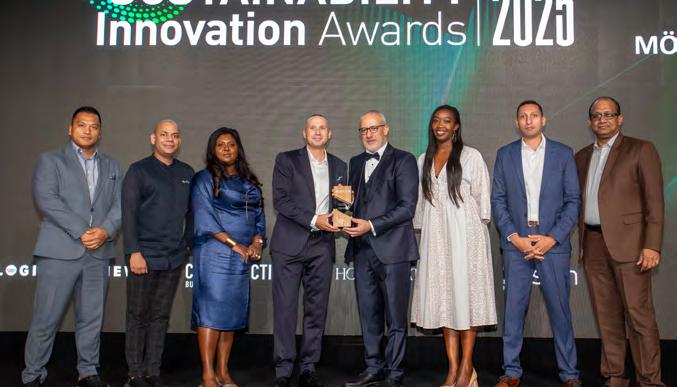
Zero Plastic Initiative of the Year
Initiative: Beyond Plastic Packaging Initiative
Winner: Hansgrohe
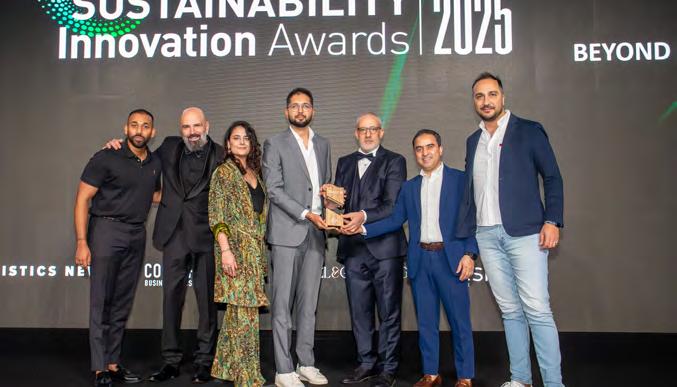
Mövenpick Resort Al Marjan Island has been honoured for its exceptional integration of eco-conscious practices within luxury hospitality. From eliminating single-use plastics and cutting food waste with innovative technology to engaging guests in green initiatives and partnering with the UAE Food Bank, the resort leads by example. Recognised globally with Green Globe Re-Certification and the International Sustainability Award, it continues to set new benchmarks for sustainable hospitality in the region.
The winner is recognised for pioneering ecoconscious luxury, eliminating singleuse plastics, driving guestled ‘Stay Green’ initiatives, and championing community engagement with measurable sustainability impact.


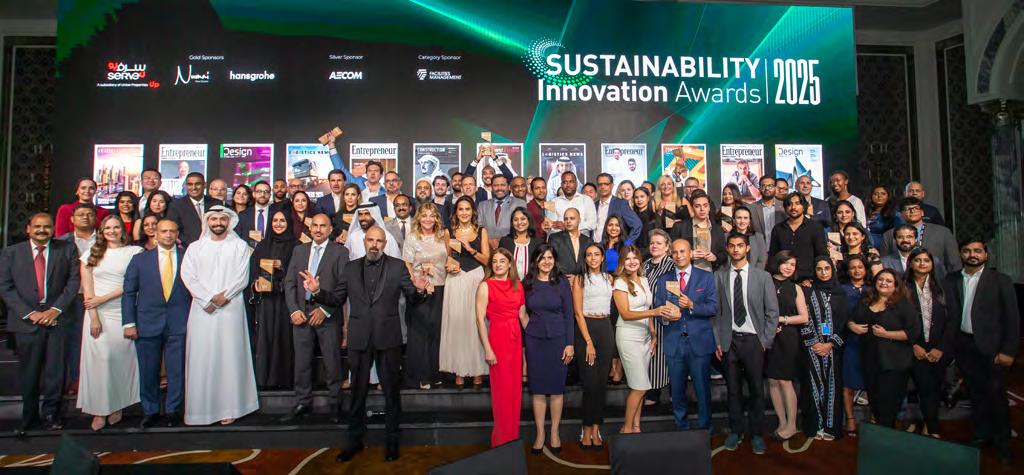
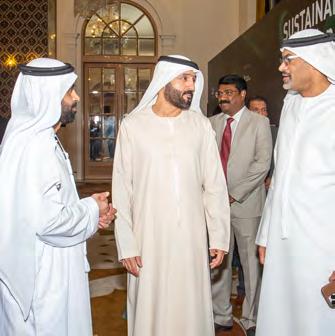

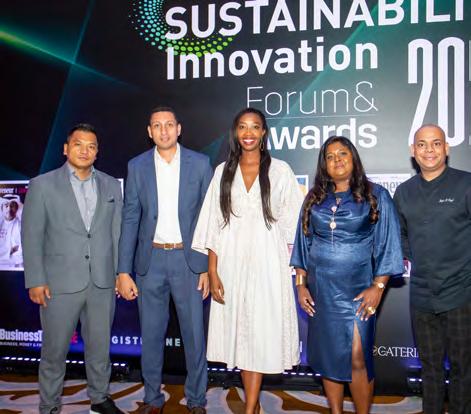
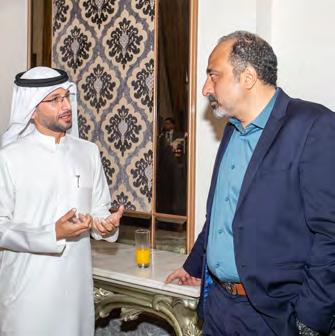
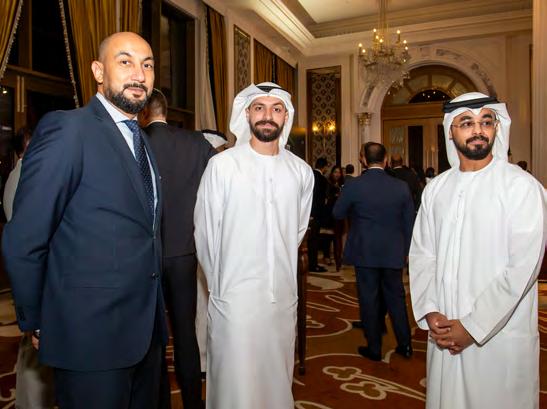



Sustainable Initiative of the Year Winner: Etihad Water and Electricity (EtihadWE)
Initiative: Solar Powered Factory Winner: Design Infinity

Etihad Water and Electricity (EtihadWE) was honoured for its transformative role in redefining utilities in the UAE. Through smart metering, rooftop solar, EV charging infrastructure, and reverse osmosis desalination, EtihadWE has delivered data-driven, decentralised, and decarbonised solutions aligned with national sustainability goals. Its customercentric, tech-enabled approach is not only reshaping the utility sector but also empowering communities to actively contribute to a cleaner, smarter, and more resilient energy future.
With initiatives like a rooftop solar PV system generating 600,000 kWh/year and offsetting nearly half of its facility’s energy use, alongside active CSR engagement through Emirates Environmental Group and wellness campaigns, the company is setting a high standard for eco-conscious practices in the interior design industry.


The winner is driving sustainability through decarbonization, digital innovation, and environmental protection. With initiatives in clean energy, emissions reduction, and ecosystem conservation, it sets new benchmarks in the MENA region.

Green
Winner: AECOM
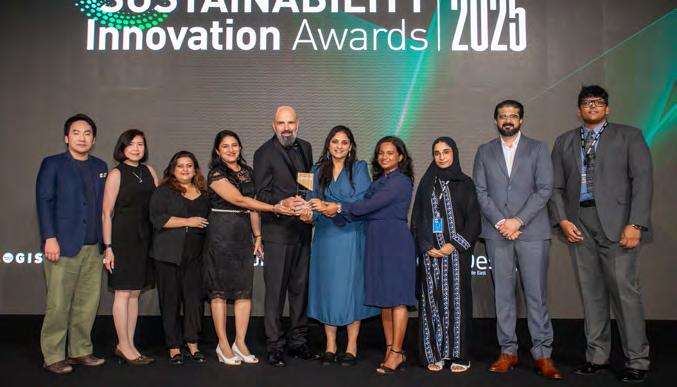
AECOM was honoured for its unwavering commitment to technical excellence, sustainable innovation, and communityfocused infrastructure. Through world-class digital solutions, robust training networks, and its transformative Sustainable Legacies strategy, the firm is shaping more resilient, inclusive, and equitable infrastructure. By embedding sustainability, empowering talent, and engaging communities, they are helping build a future where infrastructure delivers lasting social and environmental impact.



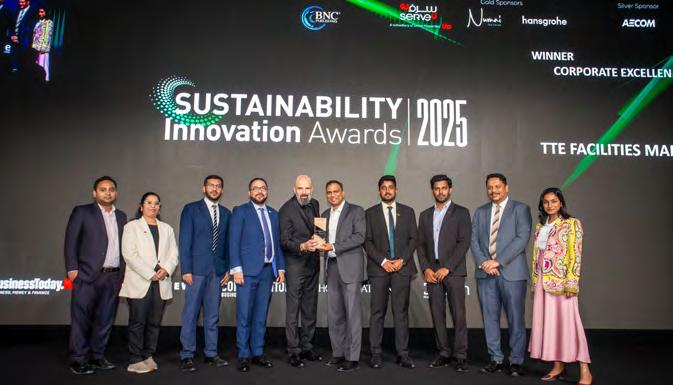
AtkinsRéalis was recognised for its groundbreaking School of the Future initiative, which empowers the next generation to reimagine sustainable learning environments while fostering a passion for STEM. Through hands-on design challenges, the programme inspires students to think critically about sustainability and apply real-world solutions, bridging education, innovation, and environmental stewardship in a truly impactful way.
TTE Facilities Management won the Corporate Excellence Award due to their comprehensive integrated facilities management services across the UAE, including hard and soft services, retrofits, refurbishments, and security. Their engineering-led approach, compliance with global industry standards, and significant yearover-year growth in revenue and customer base, along with a high client retention rate, demonstrate their operational excellence and commitment to client satisfaction.


Eco-Friendly Hotel Amenities Provider of the Year
Overall FM Company of the Year Winner: Guest Supply Winner: ServeU
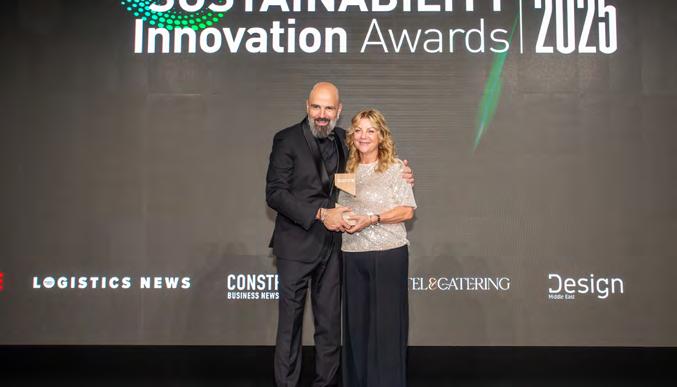
The winner is named EcoFriendly Hotel Amenities Provider of the Year for its “Sustainagility” vision, using sustainable materials, bulk dispensers, and local manufacturing to cut plastic waste and deliver low-impact hospitality solutions.

ServeU was honoured for its industryleading integration of sustainability across all facets of facilities management. From AI-powered platforms and large-scale green mobilisation to workforce training and innovative solutions like greywater recycling, they deliver measurable environmental impact without compromising efficiency. With over 95% client satisfaction and a robust ESG framework, ServeU continues to set the benchmark for sustainable FM in the region.

Project: Samana Ocean Views
Winner: Samana Developers

The winning project earns its sustainability award by integrating coral restoration and ecosensitive design. Located on a delicate island, it prioritises marine conservation and uses energy-efficient systems and sustainable materials to minimize environmental impact.

Woman Professional of the Year
Winner: Vash Singh (KEO International Consultants)
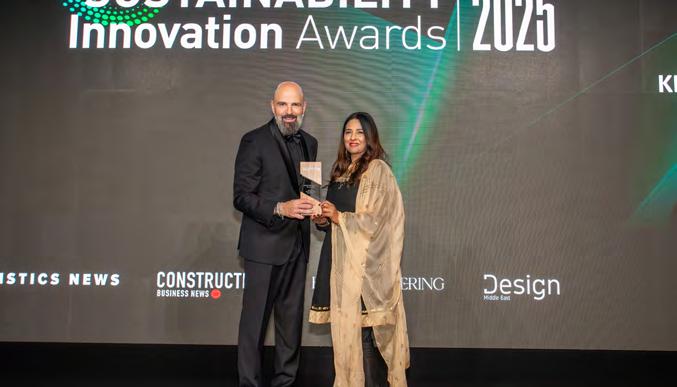
With over 30 years of technical and business expertise, she has become a transformative leader in the Middle East’s sustainability and ESG space. As Director of Sustainability at KEO International Consultants, Vash has rapidly driven commercial growth, expanded the company’s reach, pioneered decarbonisation models, and diversified its sustainability portfolio, all while empowering future leaders and redefining industry standards to make sustainability more accessible and equitable.

Winner: Samir Mulla (ALEC Energy)

As Operations Manager at ALEC Energy, he has driven the successful delivery of numerous solar photovoltaic projects, aligning with the UAE’s Net Zero 2050 goals. With over 16 years of experience in civil engineering and project management, Samir champions green building standards, energy-efficient systems, and waste reduction strategies. His commitment to integrating renewable energy and sustainable practices into largescale construction has made a significant environmental impact, earning him recognition as a top Environmental Impact Strategist.

Entrepreneur of the Year
Winner: Nayla Haddad (One of a Kin)
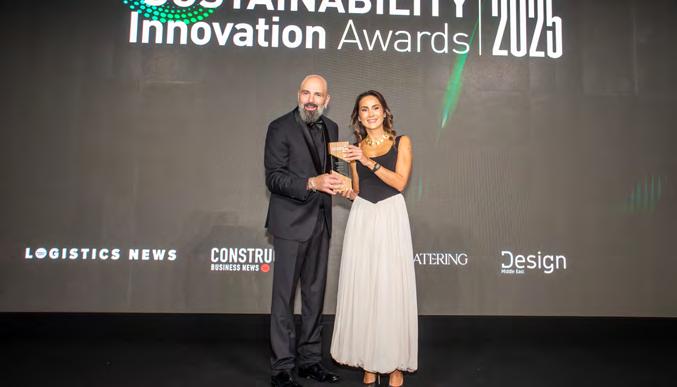
By creating a circular production process that upcycles fabric waste and using innovative, ecofriendly materials like TENCEL™ Modal x Micro, she significantly reduces environmental impact. Her brand’s commitment extends to energy-efficient production, eco-packaging, and partnerships that prioritise carbon reduction. Nayla’s leadership has driven strong business growth, impactful collaborations like the Calm app partnership, and charitable initiatives such as donating Sleep Buddy profits to Dubai Cares.

Winner: P.R. Jagannathan Company: Sobha Realty
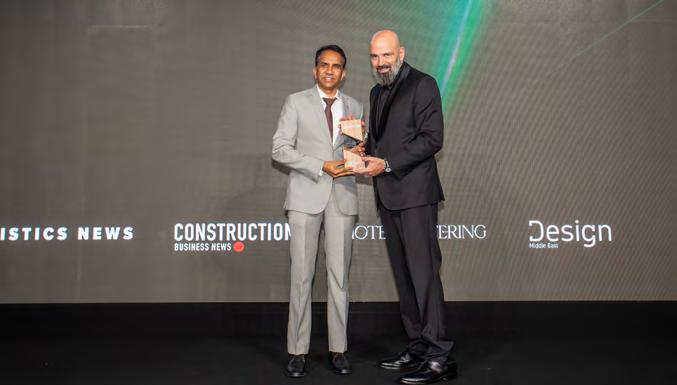
As Senior General Manager, Sustainability at Sobha Realty, he champions ESG integration, climate reporting, and has led the group’s net-zero transition roadmap. Actively involved with UAE’s highlevel sustainability initiatives and global ESG benchmarking through GRESB, Jagannathan has also played a key role in developing green building codes and strategic Emirate programs. His visionary commitment to combating greenwashing and fostering genuine climate action makes him a deserving candidate for leadership recognition in sustainability.

CEO of the Year
Winner: Yousuf Fakhruddin Company: Fakhruddin Properties

The winner blends sustainability, wellness, and smart tech in developments, expanding globally and setting new standards for health-focused, climateconscious living with a strong commitment to people and planet.

Winner: Kabir Mulchandani
Company: FIVE Holdings
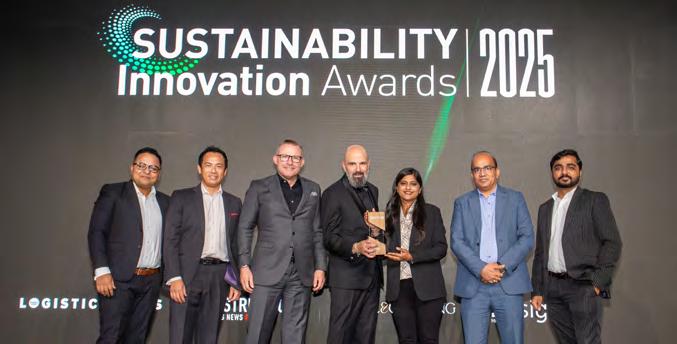
Kabir Mulchandani, CEO of FIVE Holdings, leads the creation of a groundbreaking sustainable hospitality model that blends luxury, community impact, and environmental responsibility. With a $350M Green Bond and top ESG ratings, his visionary approach drives both profitability and sustainability, earning him recognition as a leading sustainability figure in the region.




TWritten by Reeba Asghar
he world is on the move, but now, it’s doing so with a lighter footprint. As climate concerns continue to dominate global discourse, a quiet revolution is powering up across oceans, skies, and roads: green propulsion technology.
At its core, green propulsion refers to environmentally friendly systems designed to replace or supplement traditional fossil fuel engines. Think electric drives,
Smart ports, clean fuel, digital innovation — maritime transport is shedding its heavy fuel past in favour of a greener, more efficient future
hydrogen fuel cells, hybrid engines, and biofuelbased systems, all united by a single ambition: to cut harmful emissions and build a cleaner, more sustainable transport future.
While green propulsion is gaining ground in everything from electric cars to hydrogen-fuelled aircraft, one sector that’s making unexpectedly bold strides is maritime, the industry that moves over 80% of global trade across the seas.
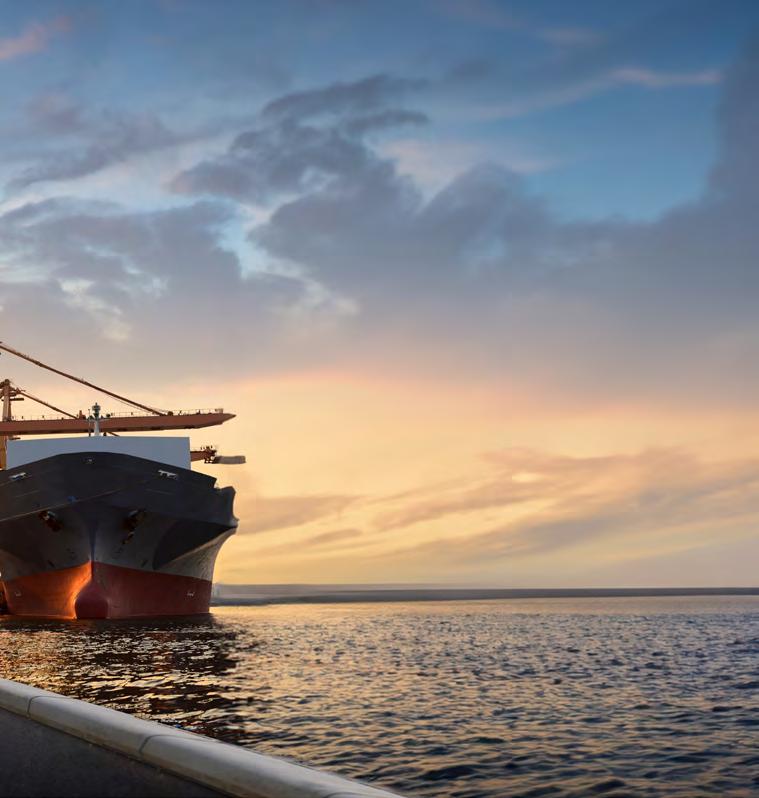
Shipping may account for roughly 3% of global CO₂ emissions, but it remains the most carbon-efficient mode of freight transport. A ship emits around 10–15 grams of CO₂ per tonne-kilometre, significantly less than trucks (60–150g) or aircraft (a staggering 500+g). That’s not to say the industry is without responsibility, rather, it holds immense potential for impact.
And nowhere is this more evident than in the United Arab Emirates.
Over the past five years, the UAE has firmly positioned itself as a global maritime powerhouse. With zero income tax, cutting-edge port infrastructure, and a location bridging East and West, it’s no wonder international shipping
giants are anchoring their ambitions here.
But the UAE isn’t just thinking economically, it’s thinking ecologically.
At COP28, hosted in Dubai, five of the world’s largest shipping company CEOs did something unprecedented: they called for a global end date for the construction of fossil fuel-
only vessels. In a sector often perceived as conservative and slow-moving, this was a thunderclap of intent.
And the UAE didn’t just host the conversation, it’s living the change.
One of the most tangible examples came earlier this year when Vopak Horizon Fujairah, a joint-venture terminal, completed the UAE’s first bio-bunker fuel operation. A ship was successfully supplied with B24 fuel, a blend containing 24% fatty acid methyl ester (FAME) and very low sulphur fuel oil. It’s a small step for one ship, but a giant leap for green maritime infrastructure in the region.
Fujairah Port has also emerged as a model for sustainability, offering LNG bunkering services in compliance with international MARPOL air pollution standards. It’s one of many signs that the country’s ports are not just future-ready, they’re futuredefining.
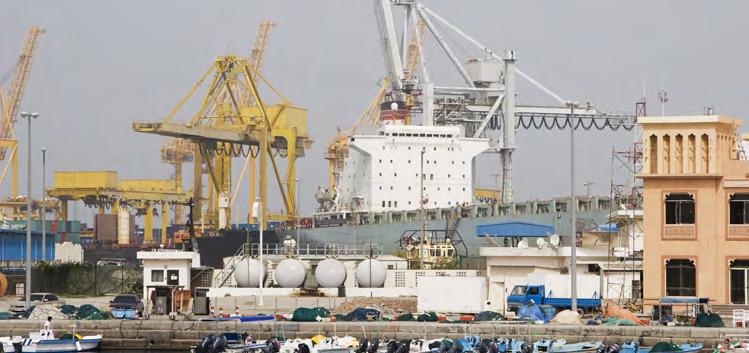
• In 2023, UAE ports handled a record 21 million TEUs (twentyfoot equivalent units).
• The maritime sector contributed approximately AED 135 billion to the national GDP.
• UAE-based companies now operate 106 ports across 78 countries - a stunning testament to its global maritime reach.
This isn’t just about ships and terminals. It’s about influence. It’s about leading the global shipping world into an era of smarter, cleaner operations.
From Blue Pass and Maqta Gateway to BoxBay’s intelligent container storage and CargoSpeed, the UAE is pioneering digital solutions that do more than move goods, they optimise, automate, and decarbonise. These technologies reduce idling, streamline supply chains, and eliminate tonnes of avoidable emissions each year.
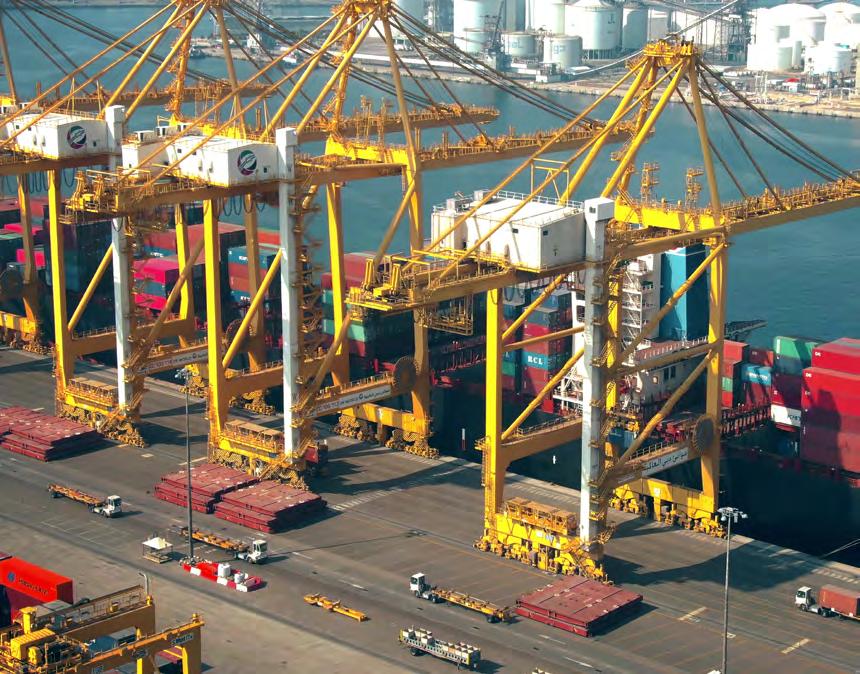
Smart ports are becoming green ports, and green ports are becoming global models.
The UAE’s Net Zero 2050 Strategy isn’t just a policy, it’s a blueprint. The country is a founding member of the Green Shipping Corridors Alliance and the Global Ports Hydrogen Coalition, showing its commitment to building the ecosystem required for long-term maritime decarbonisation.
With investments in hydrogen, ammonia, and biofuels, and a willingness to
trial new technologies and regulatory frameworks, the UAE is not just adapting to change, it’s shaping it.
Green propulsion isn’t just about reducing emissions, it’s about rethinking movement. It’s about using innovation to redefine how we connect the world while preserving the one we have. And as ports go digital, ships go clean, and policies go green, the UAE stands at the helm of a new maritime era, proving that even the biggest industries can make bold turns toward a brighter, more sustainable horizon.


